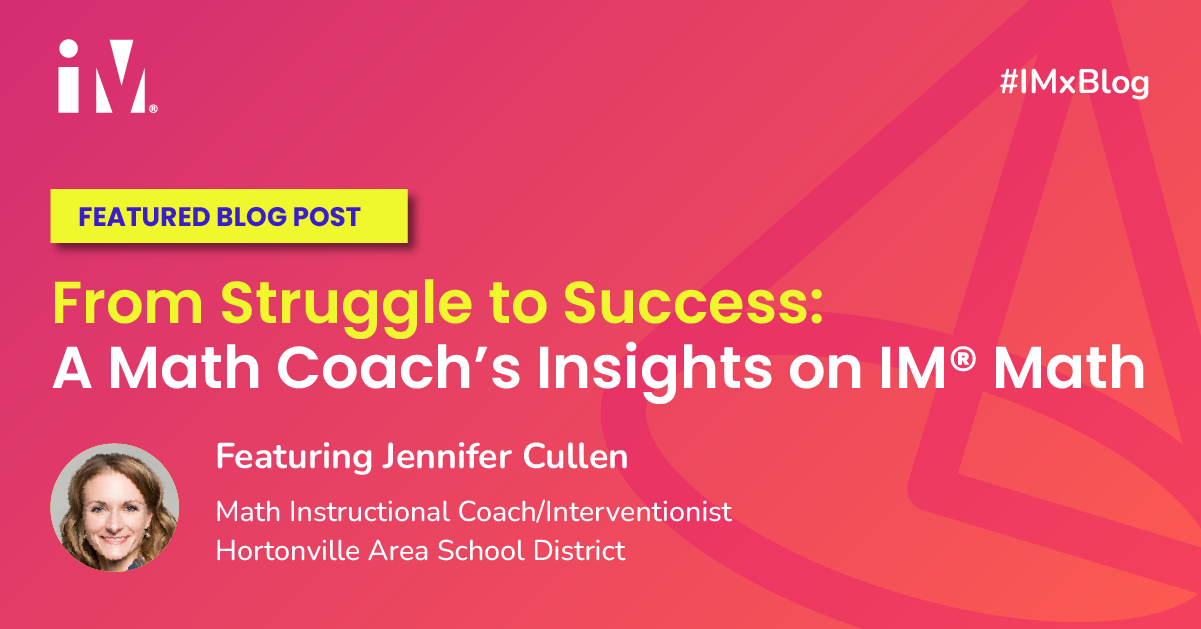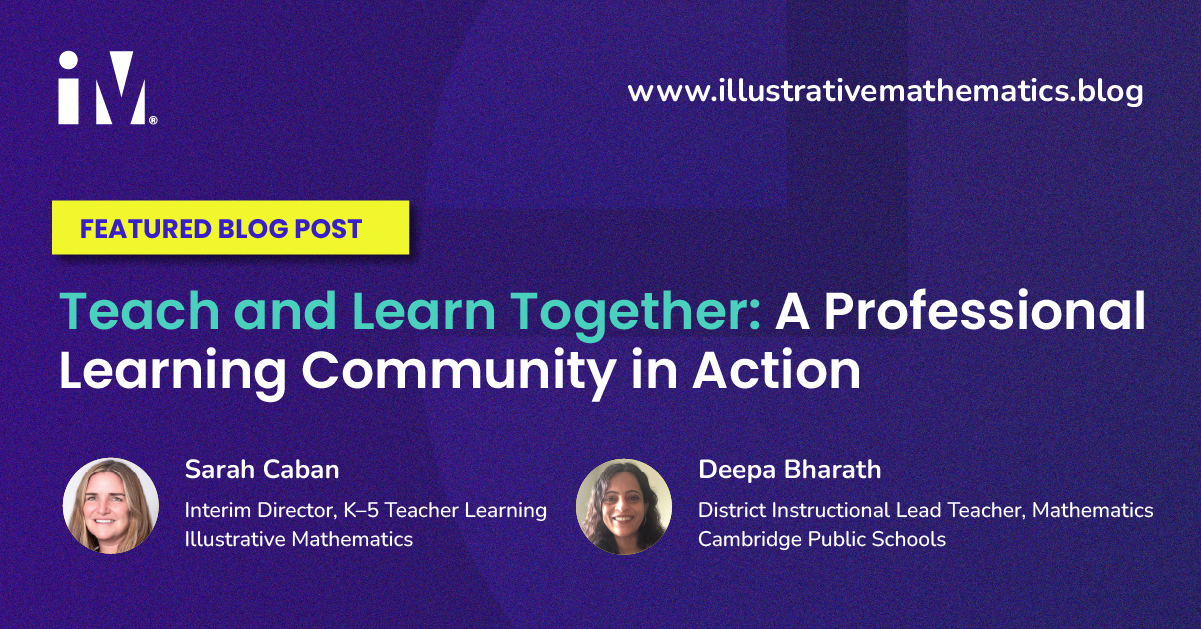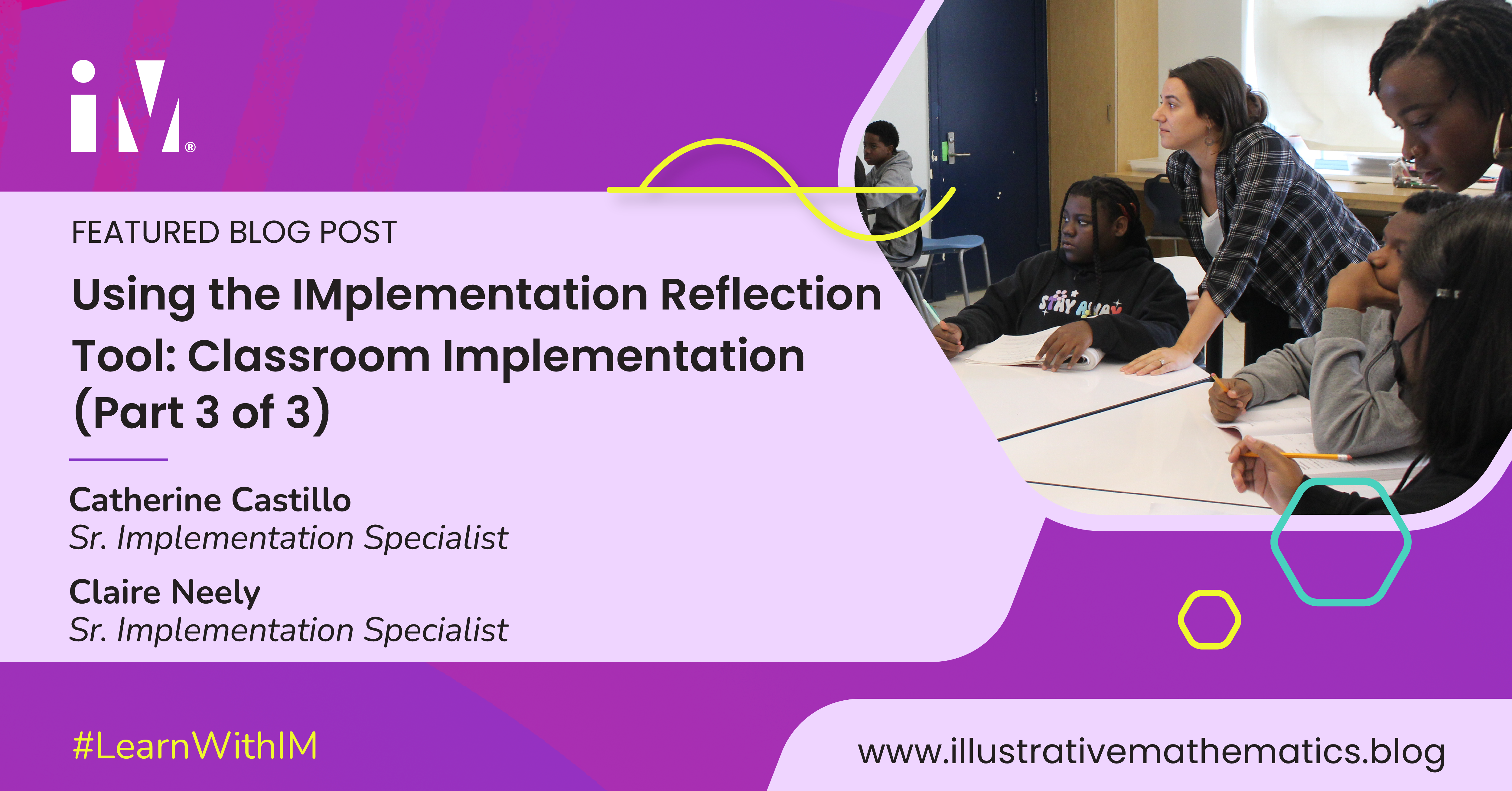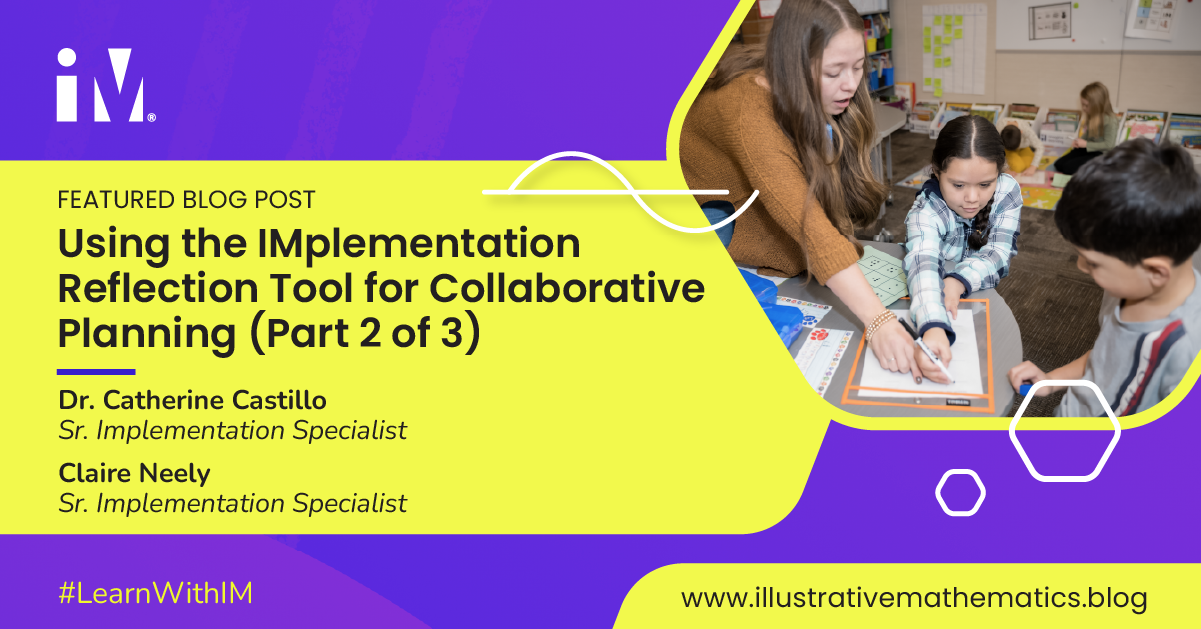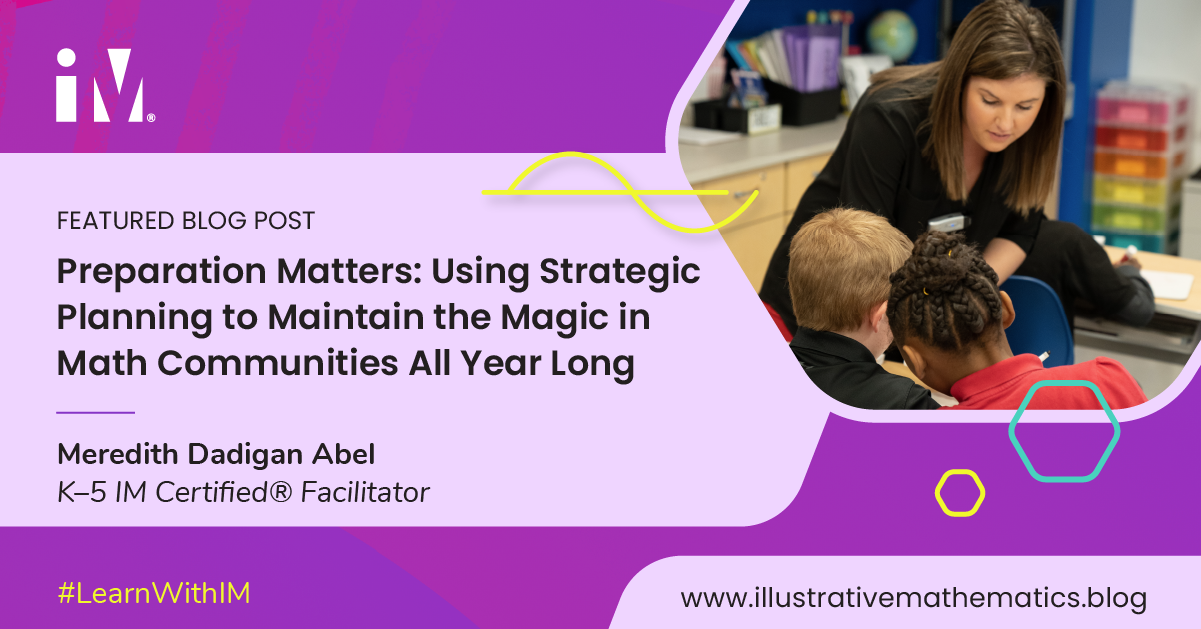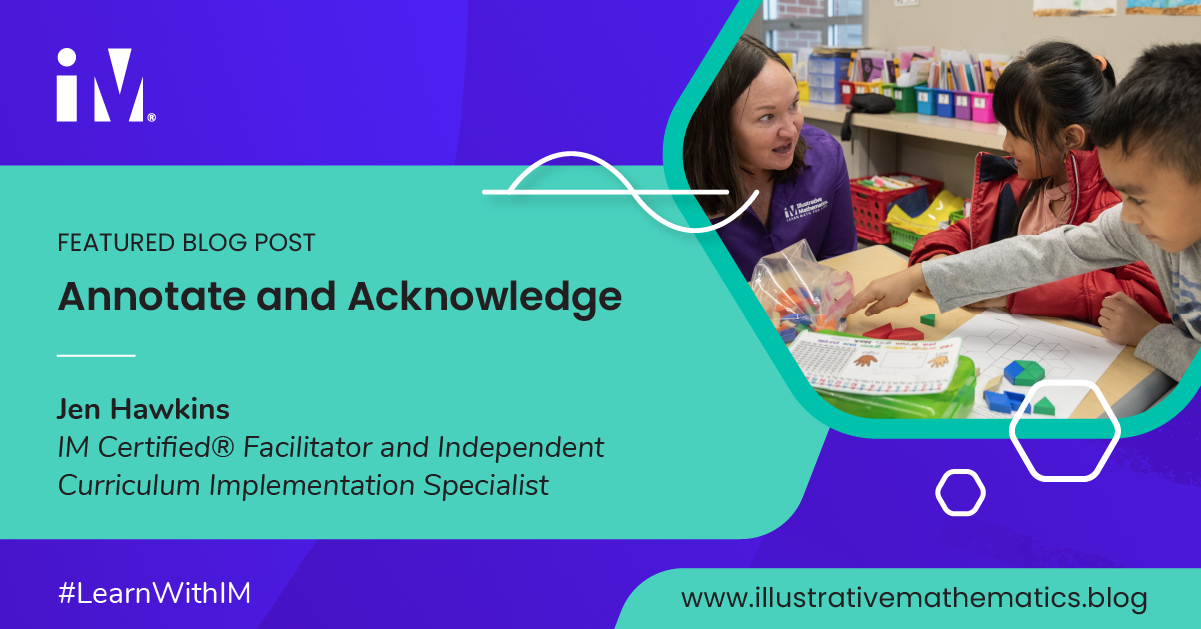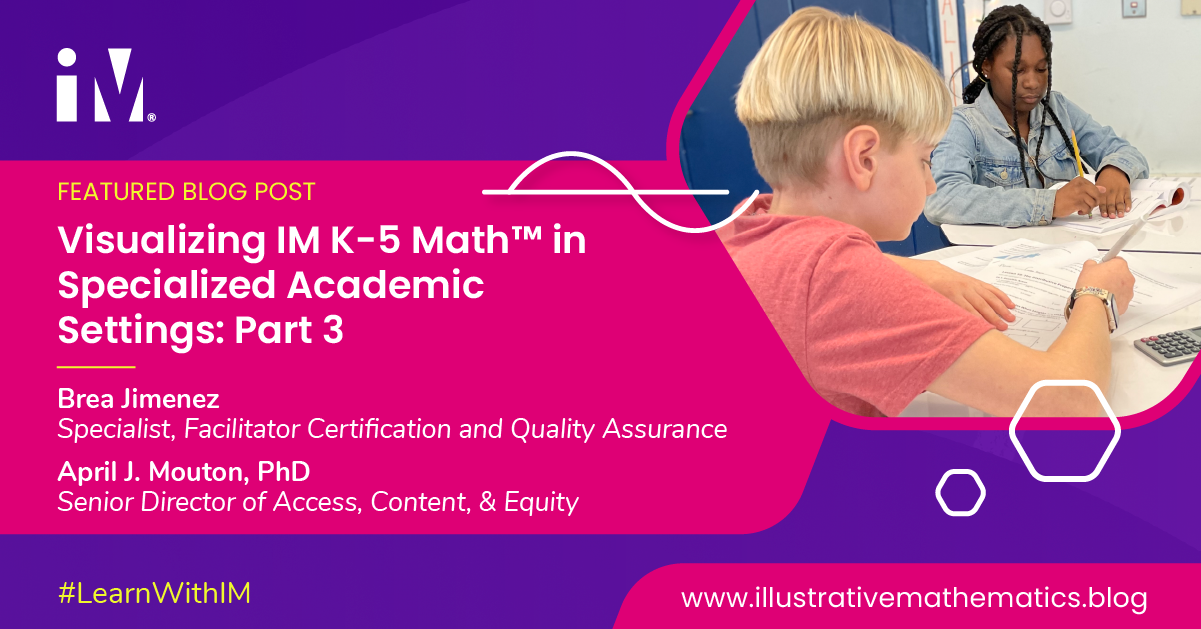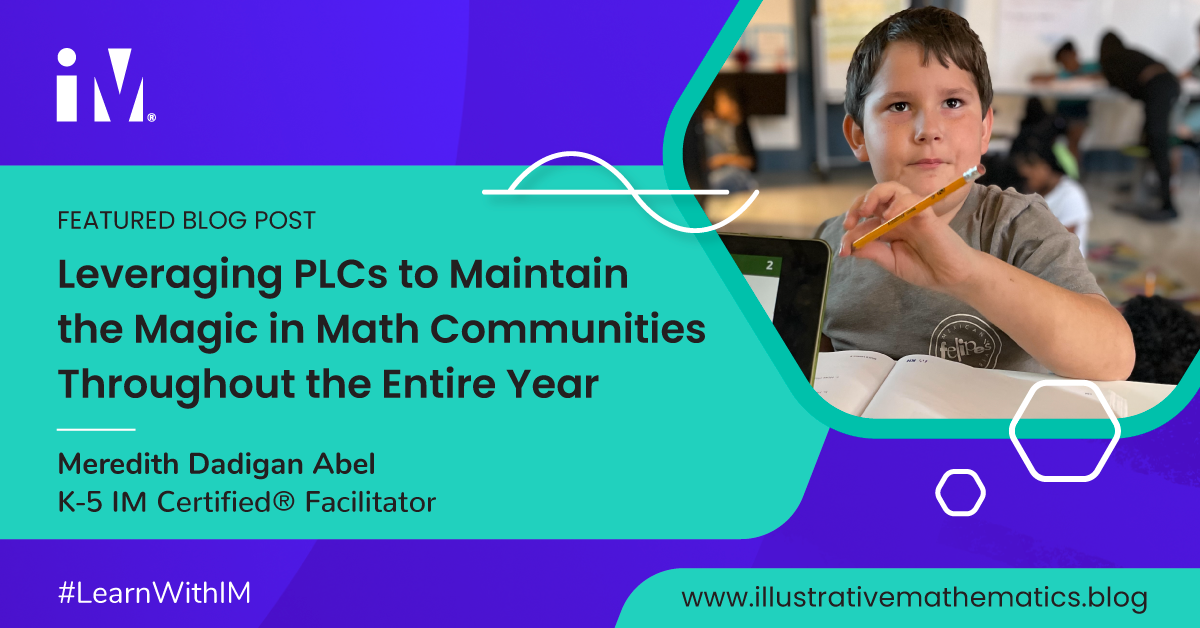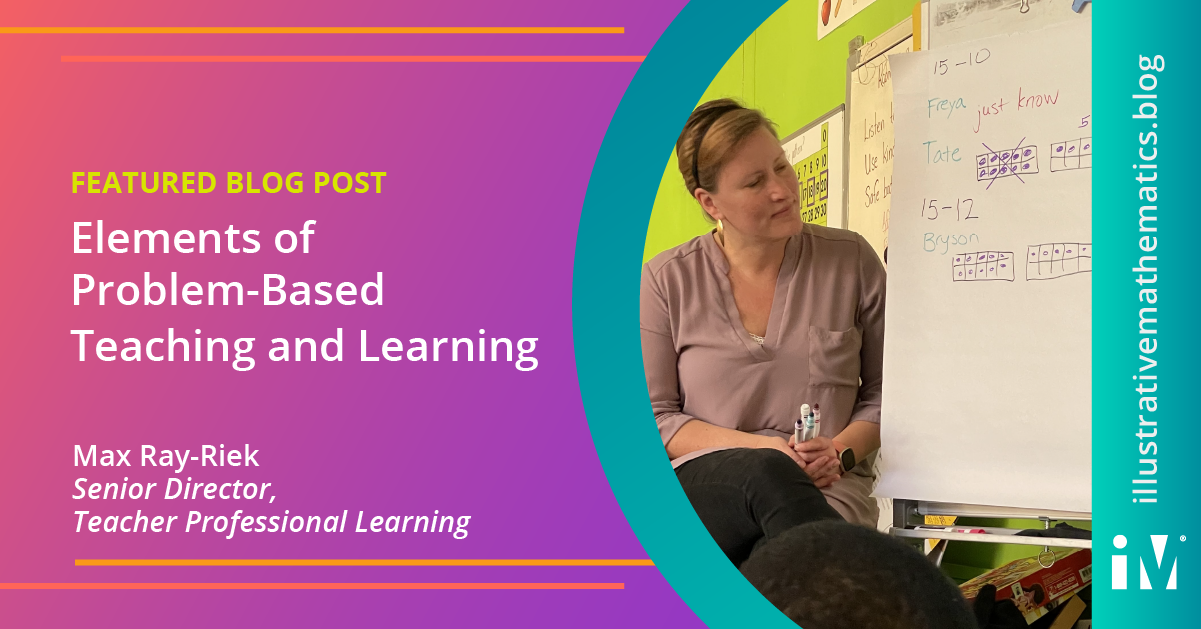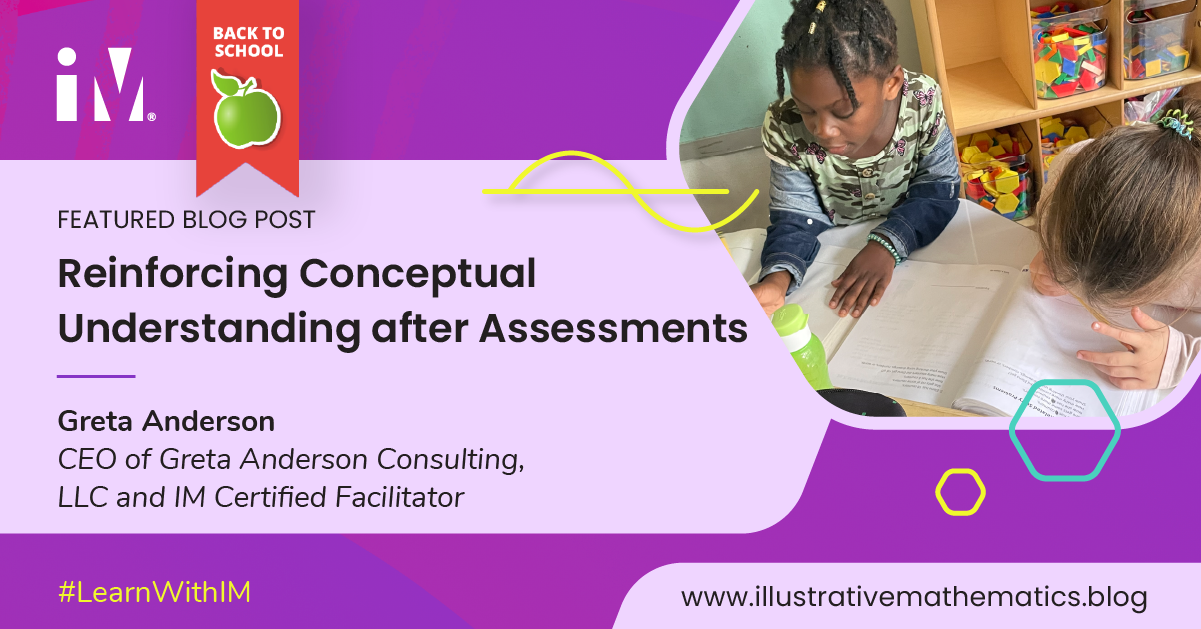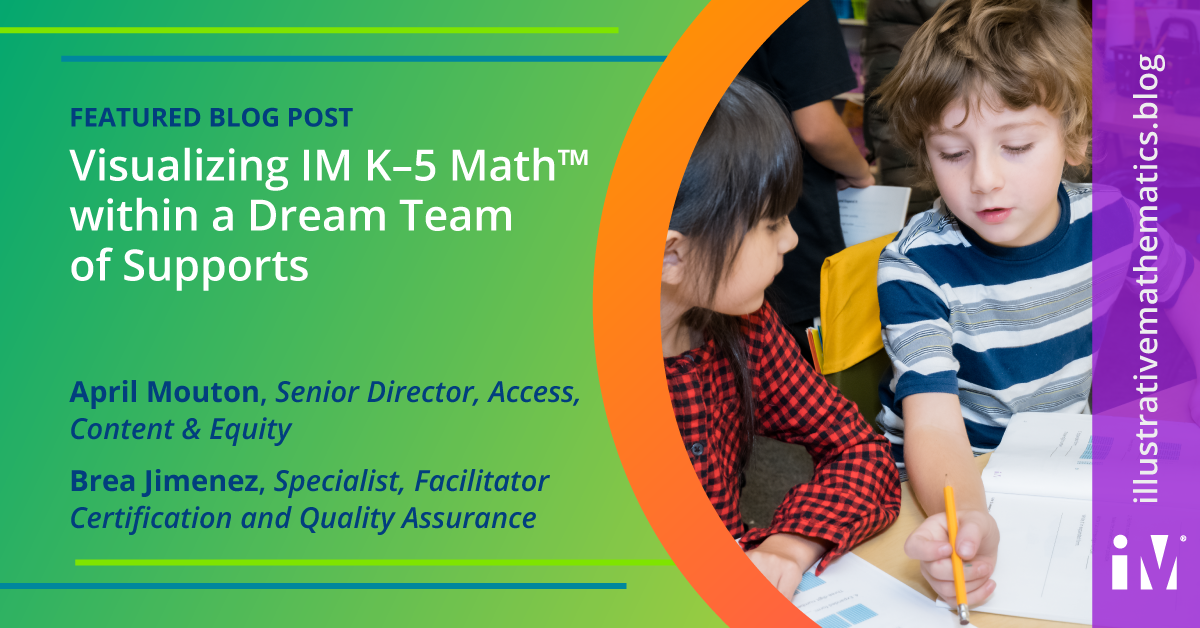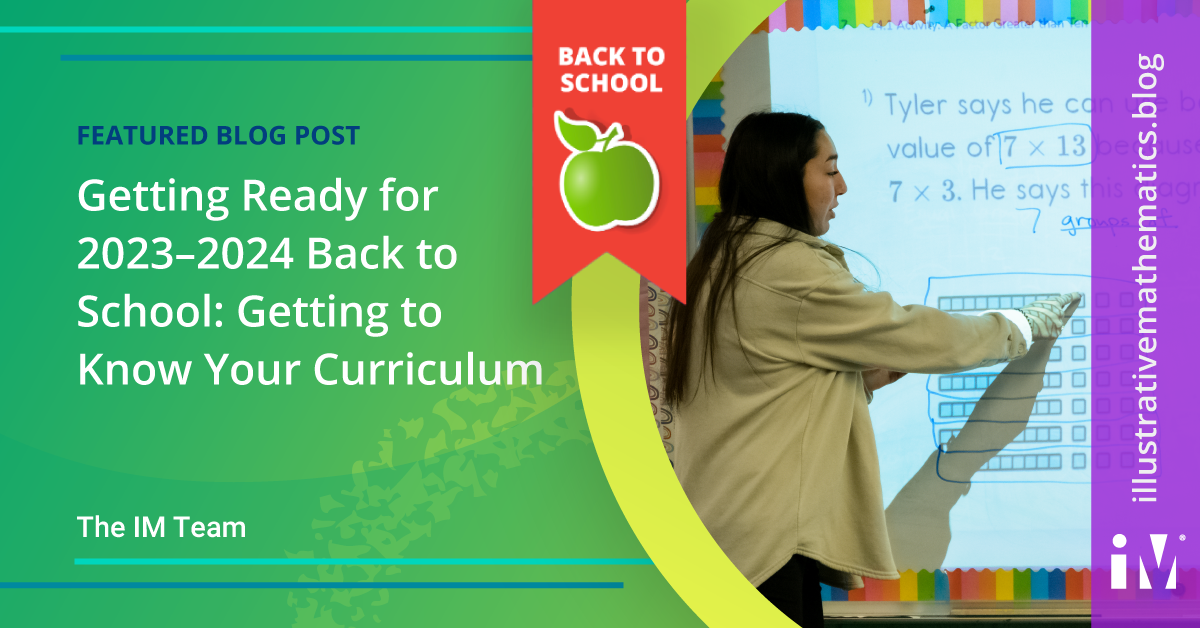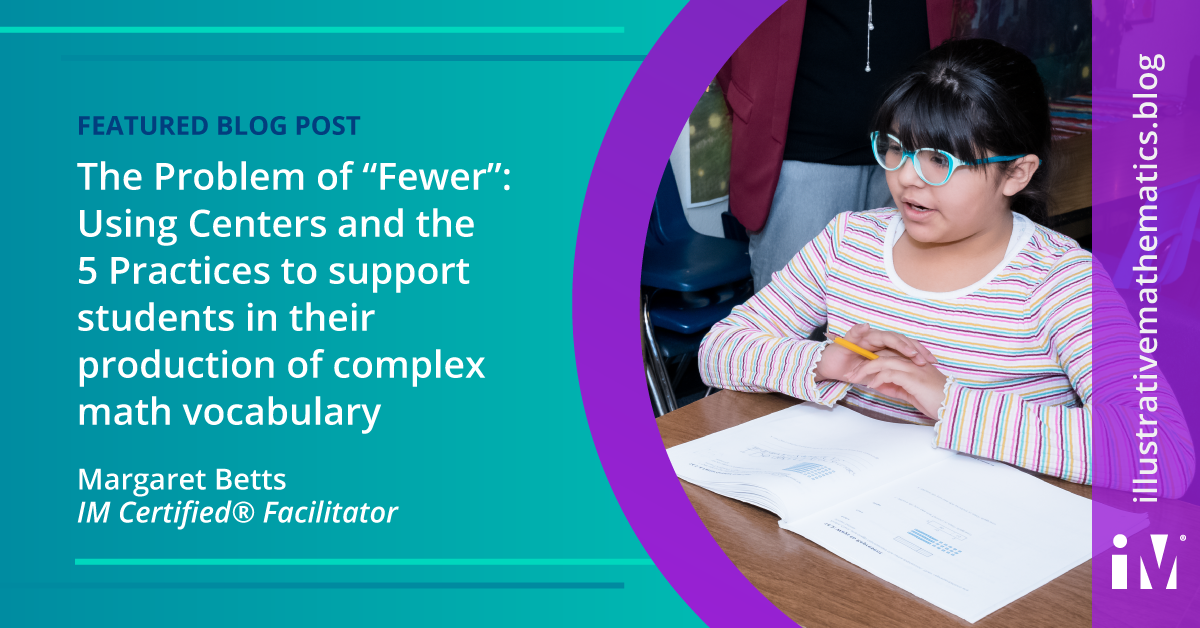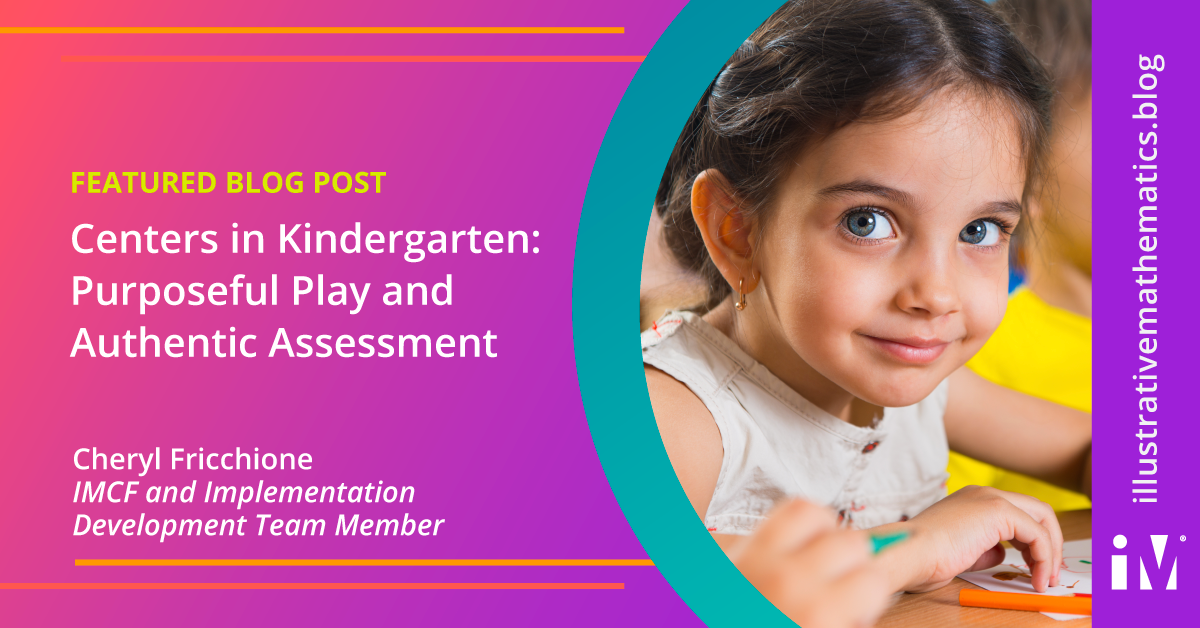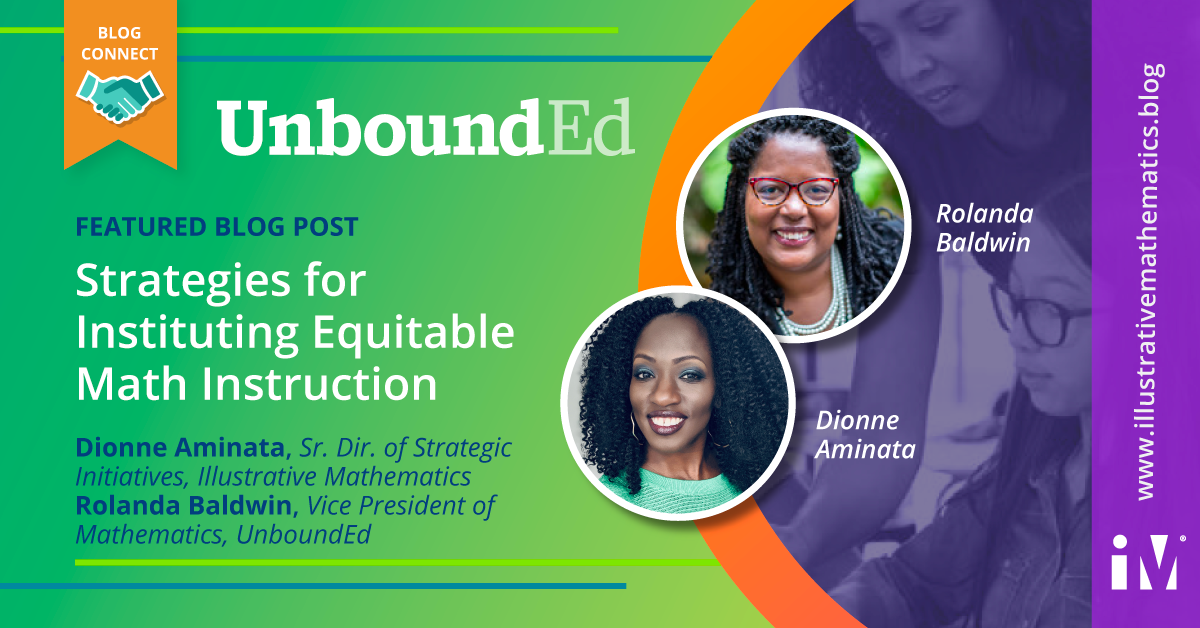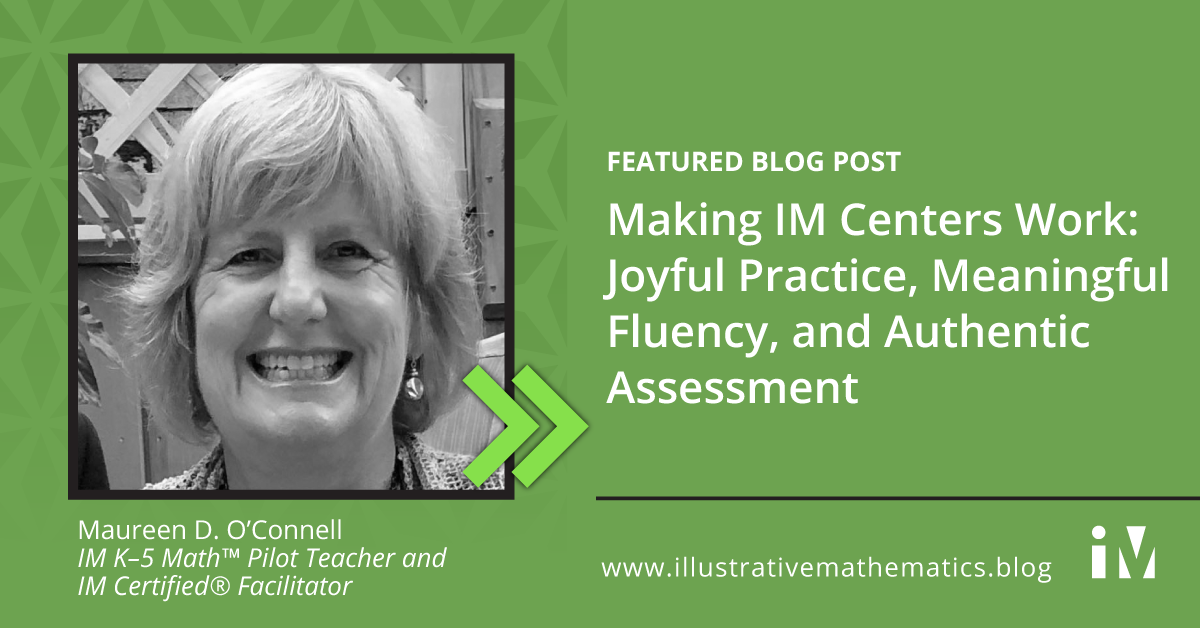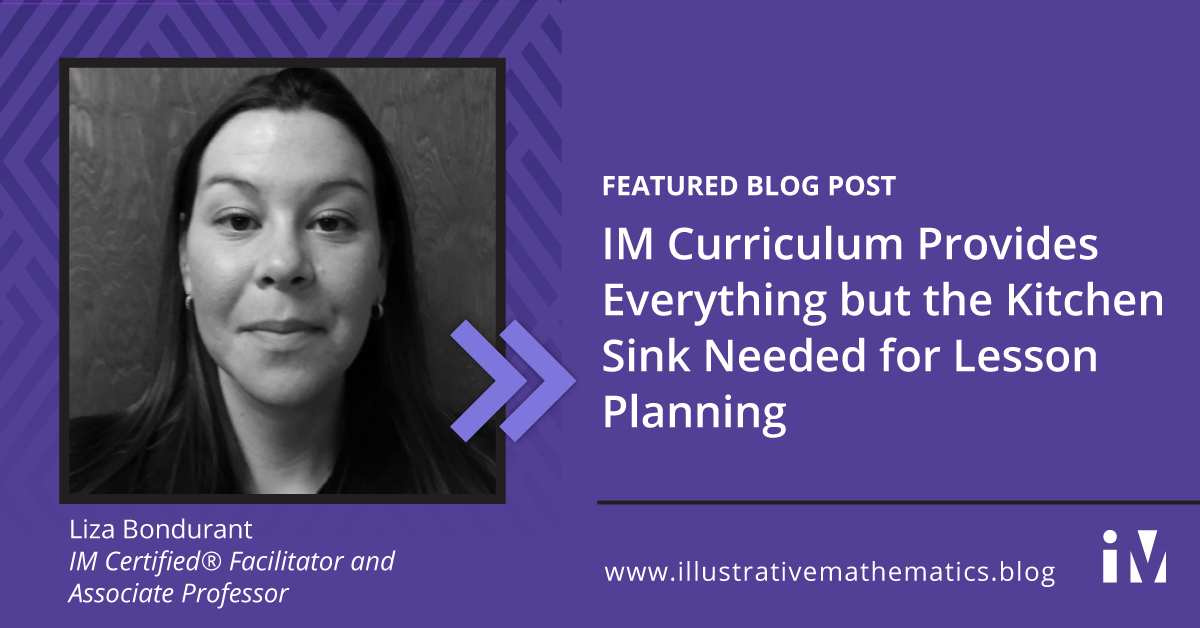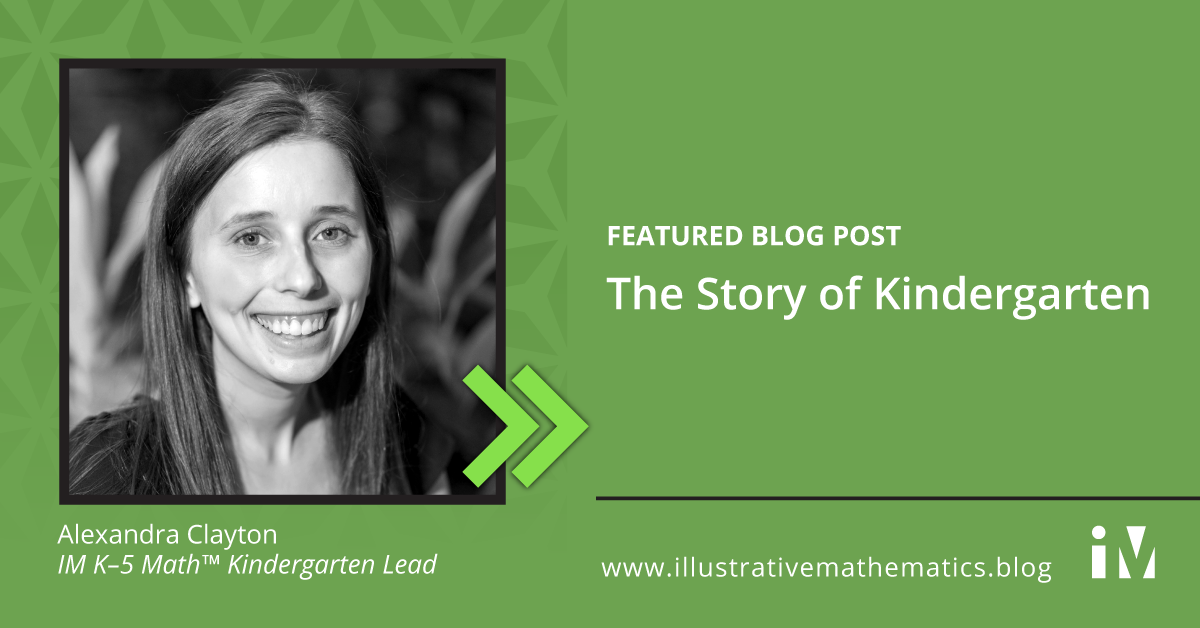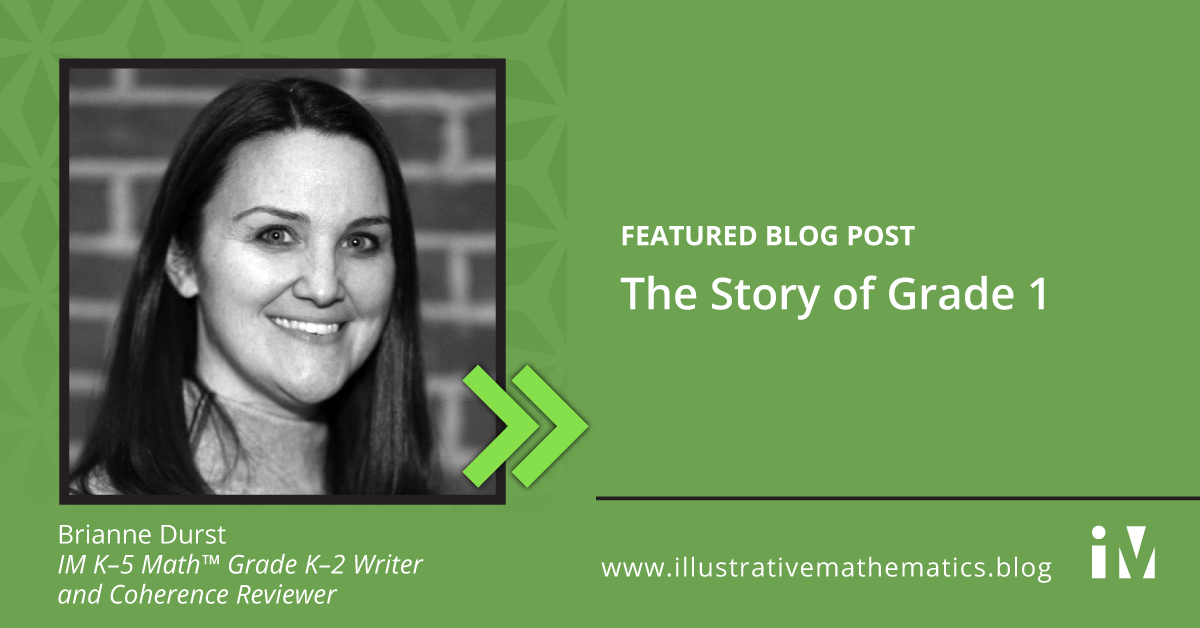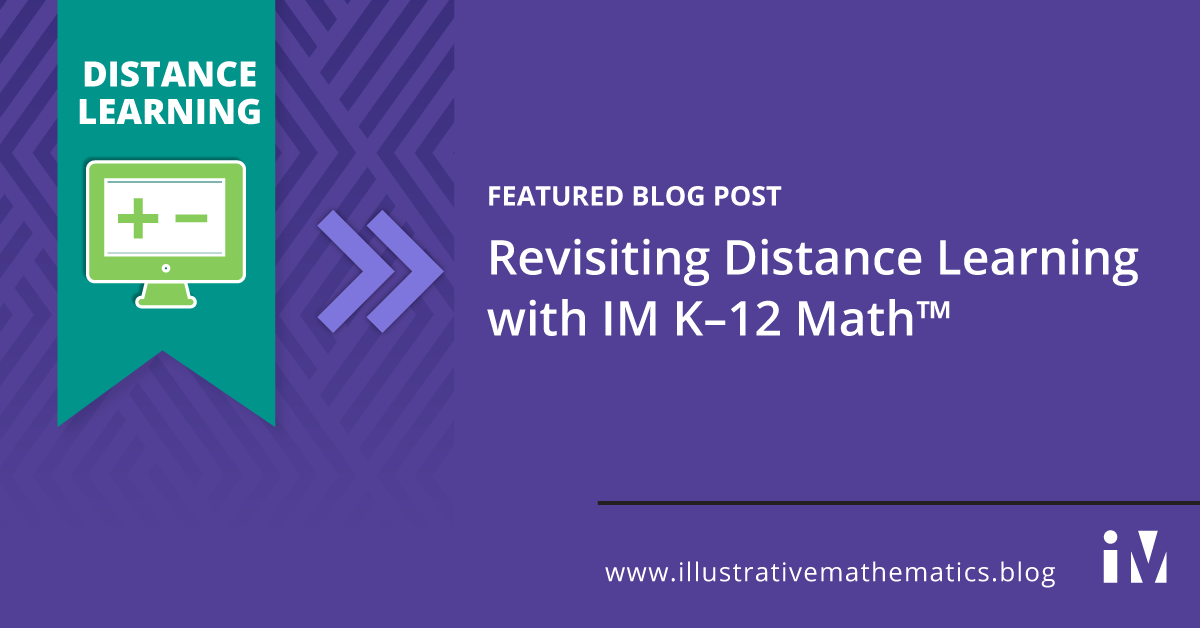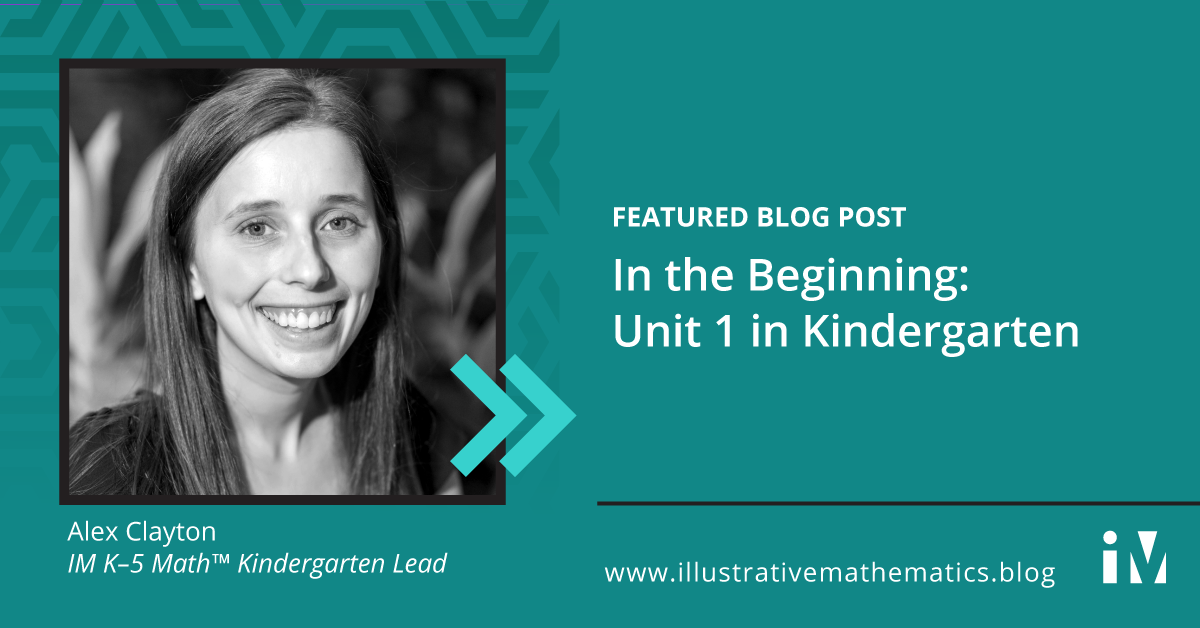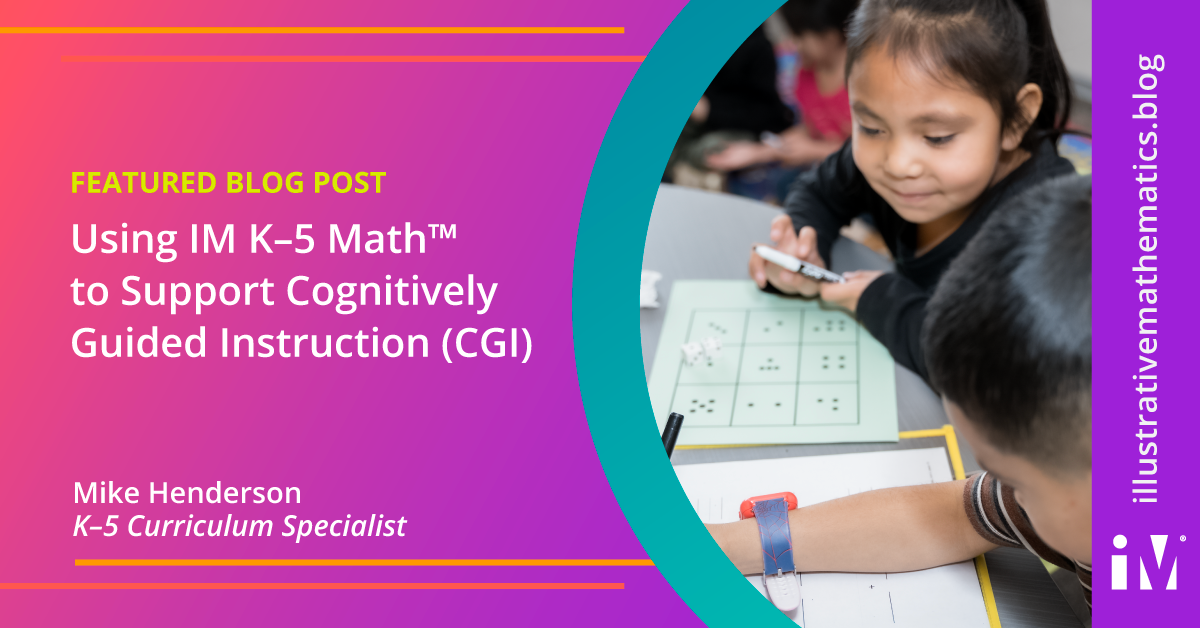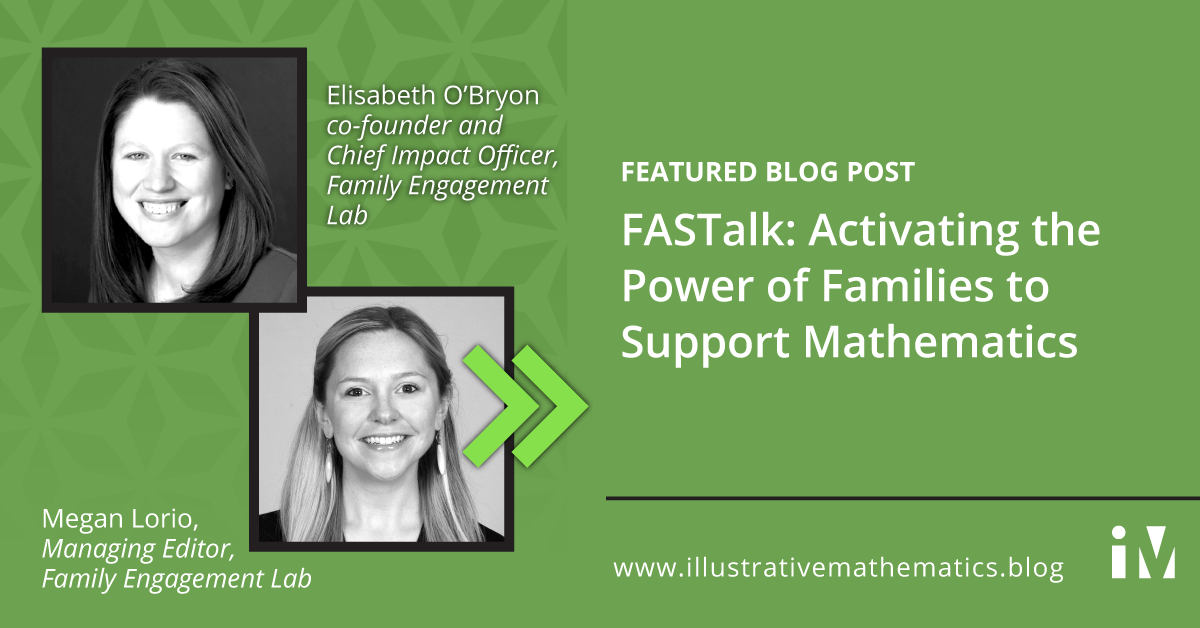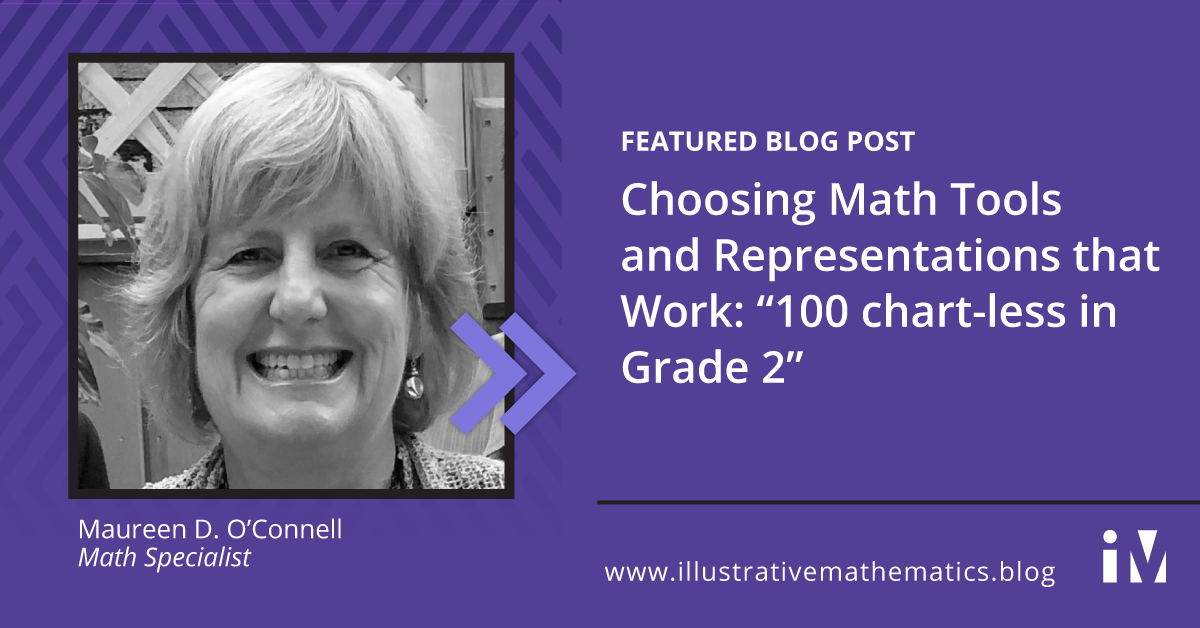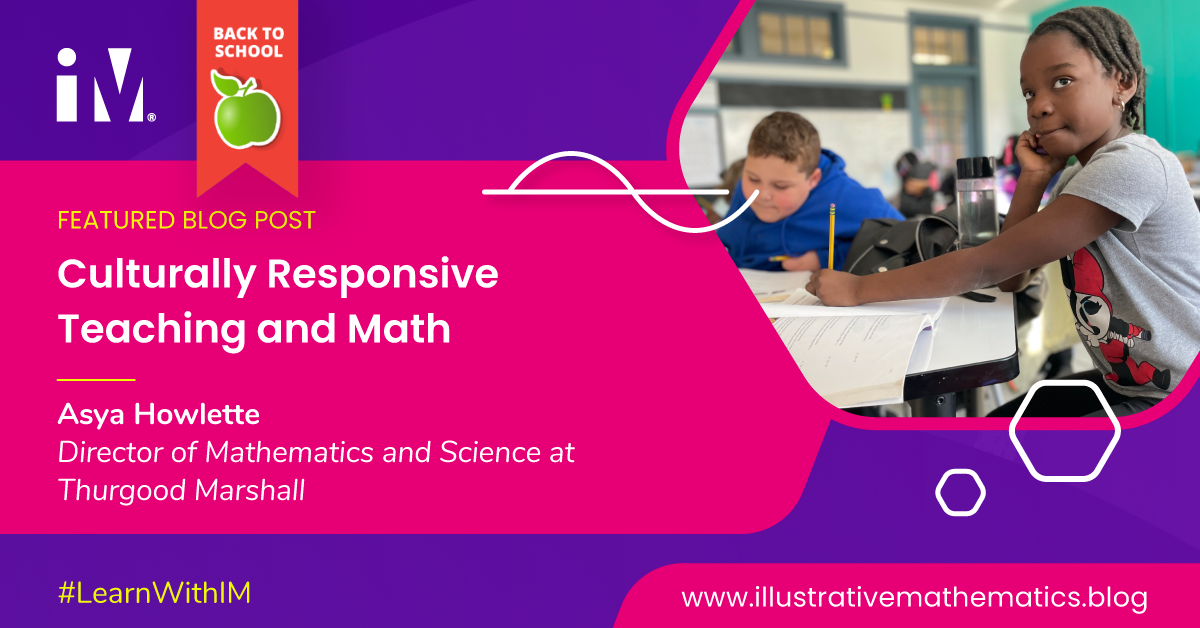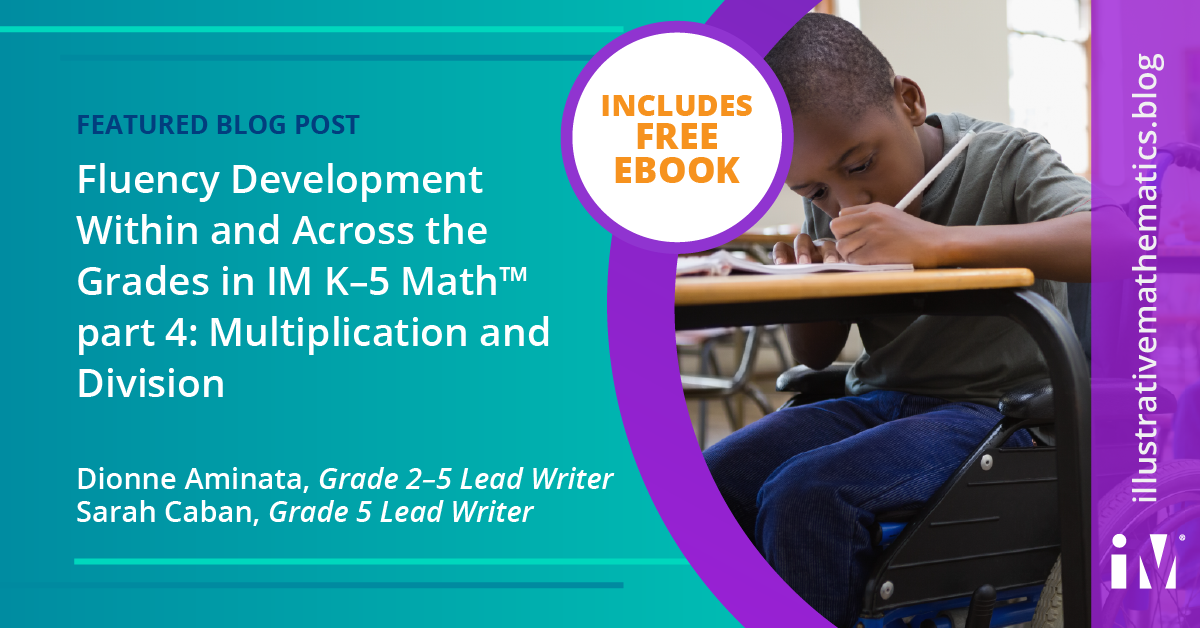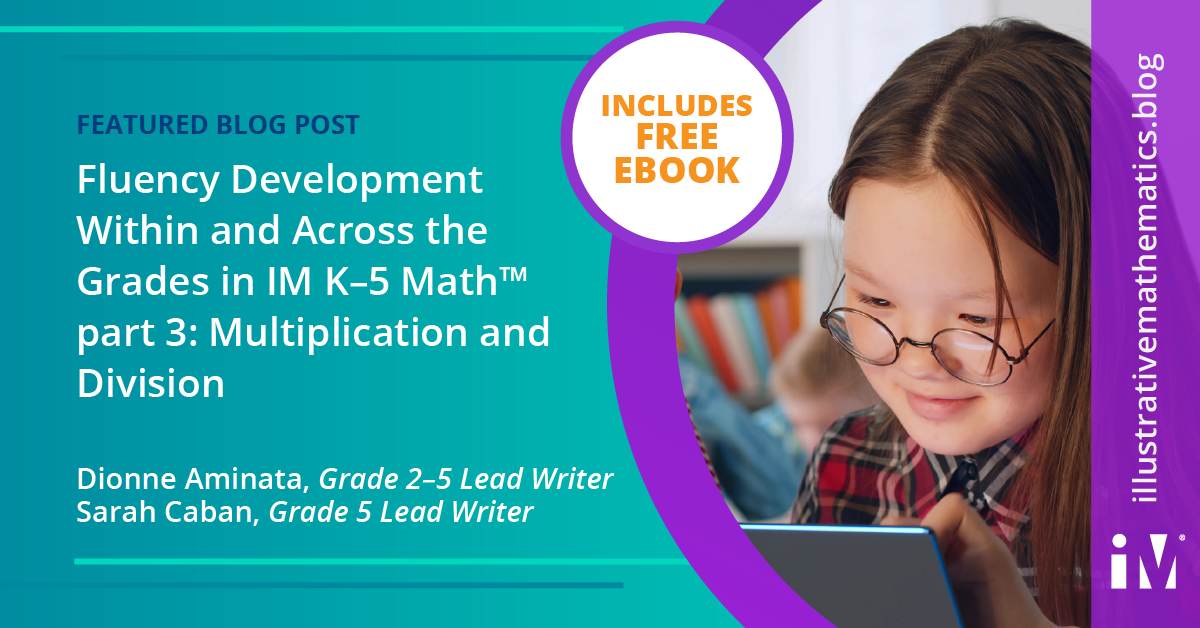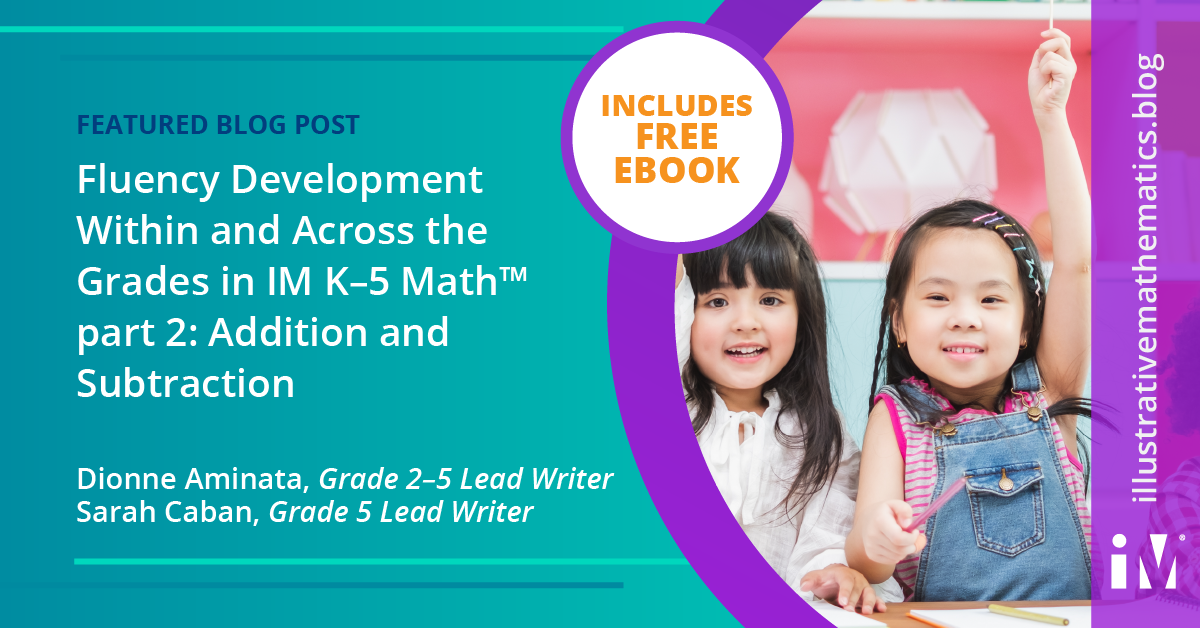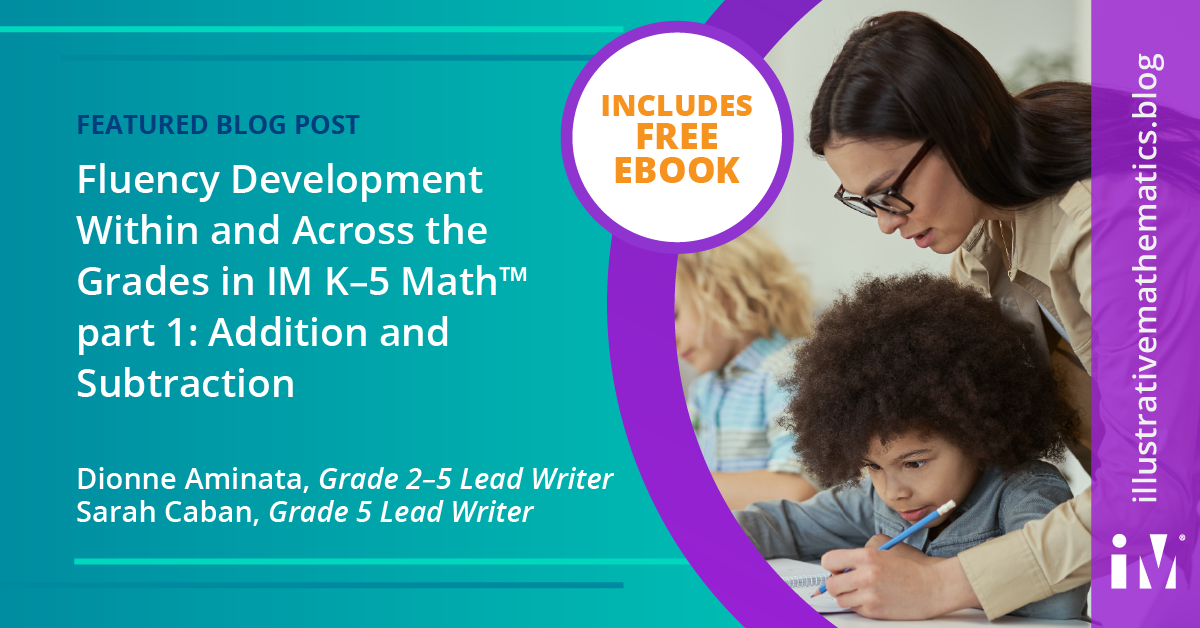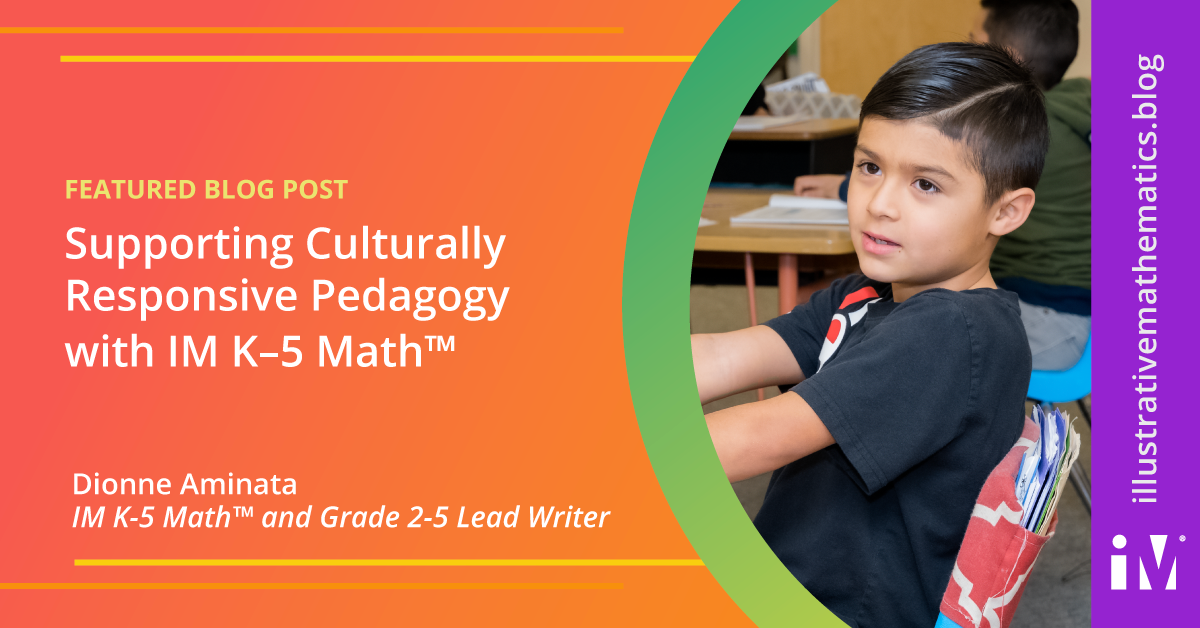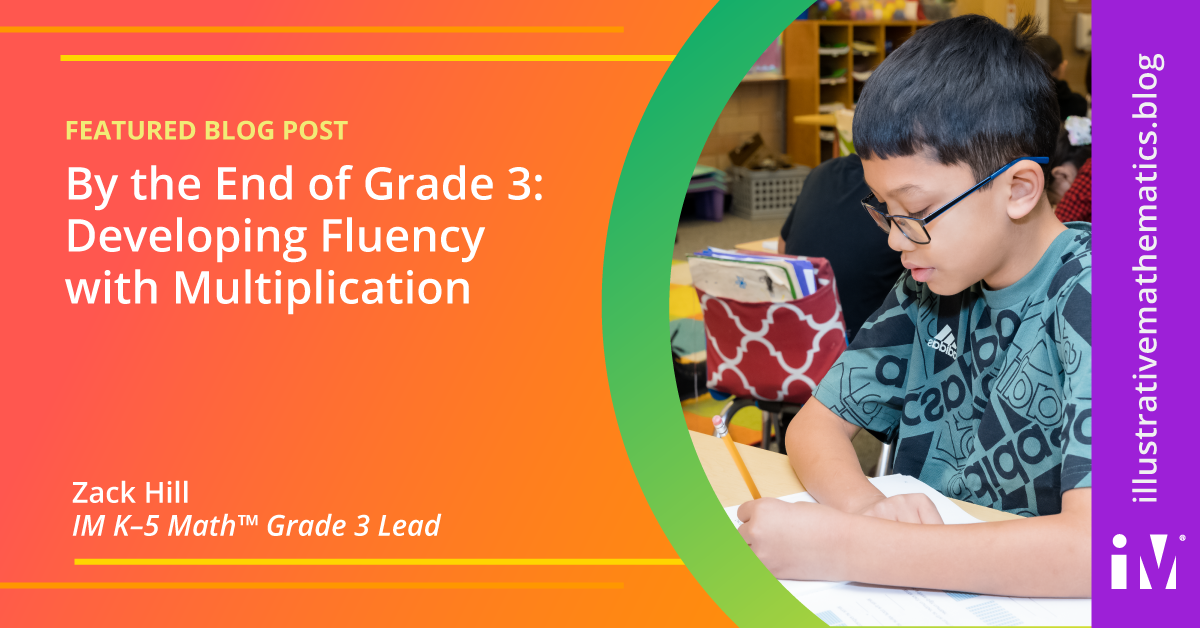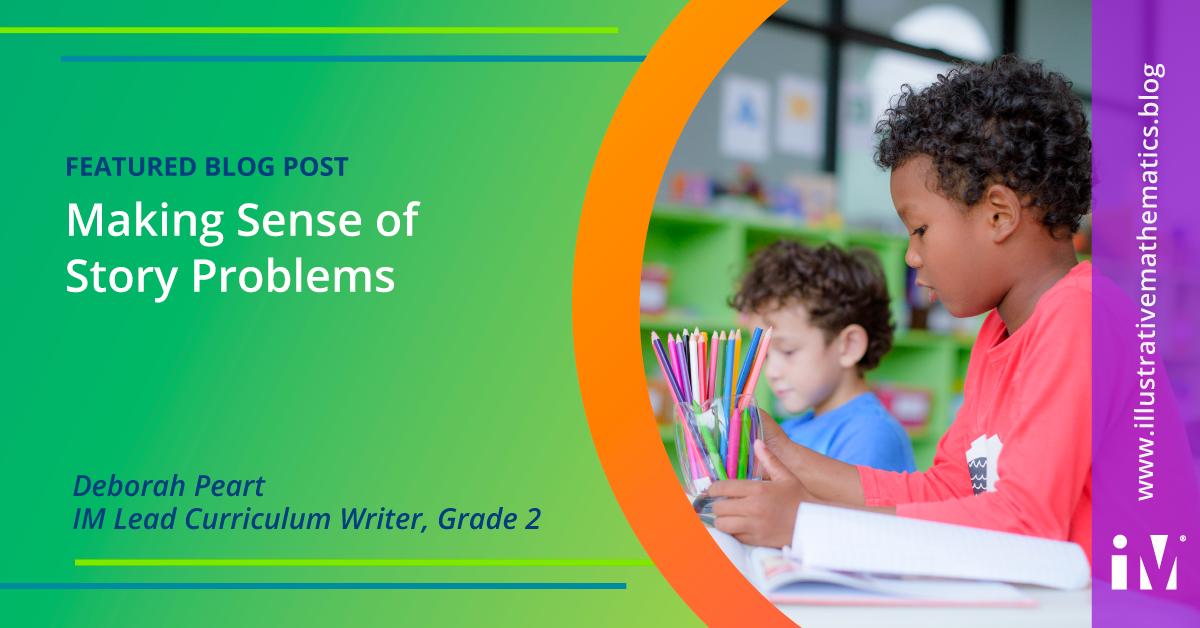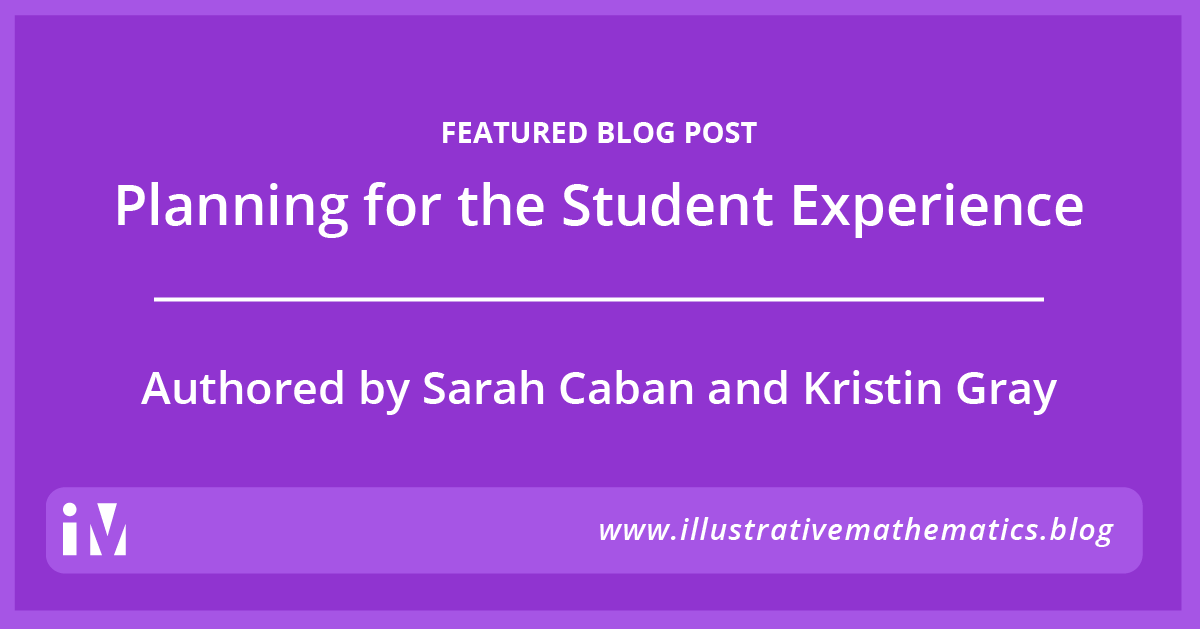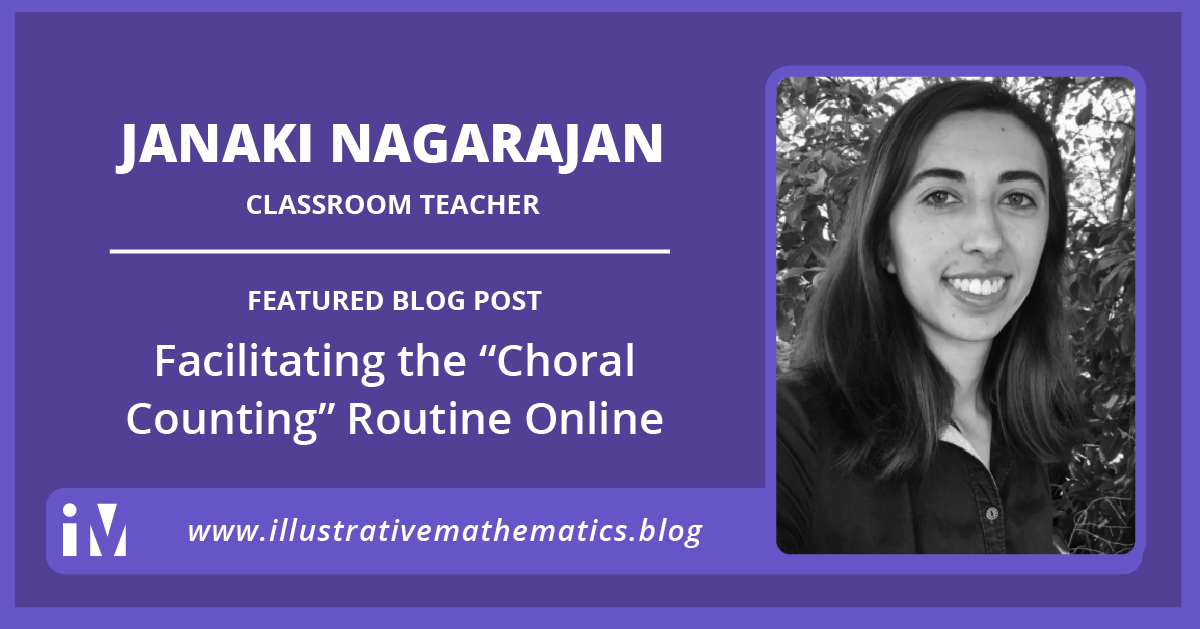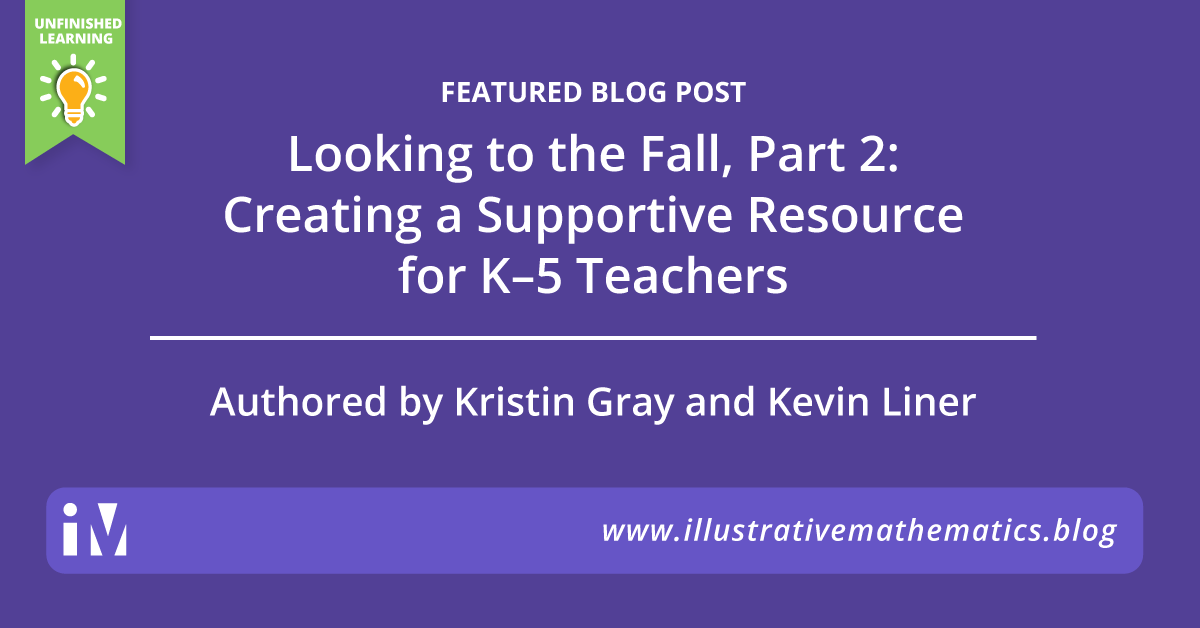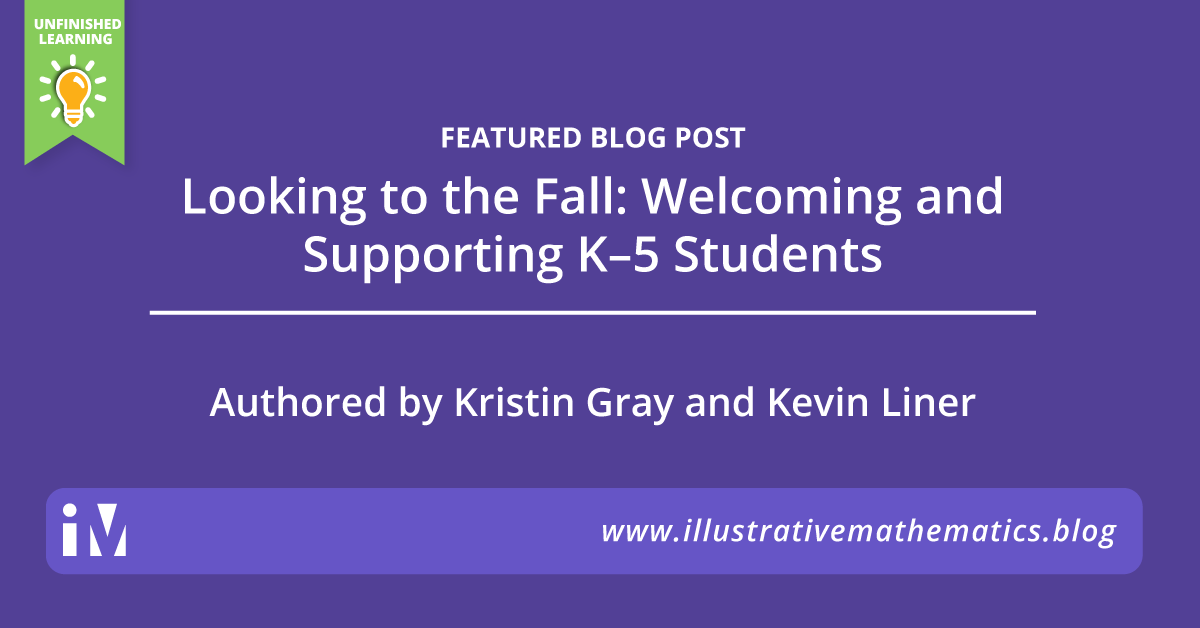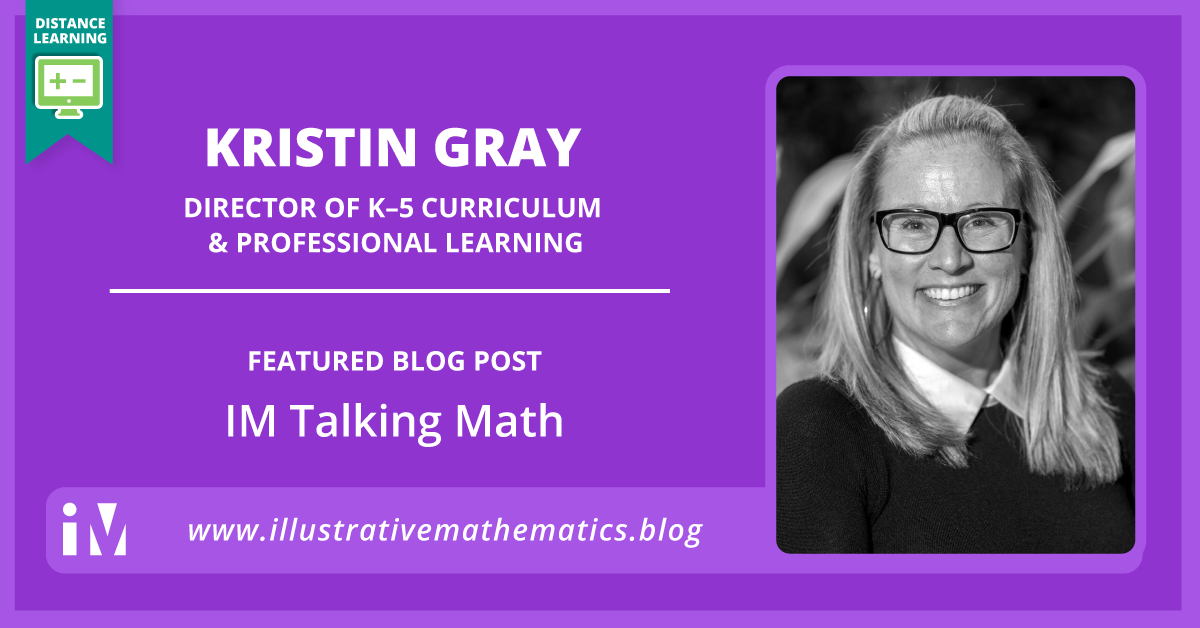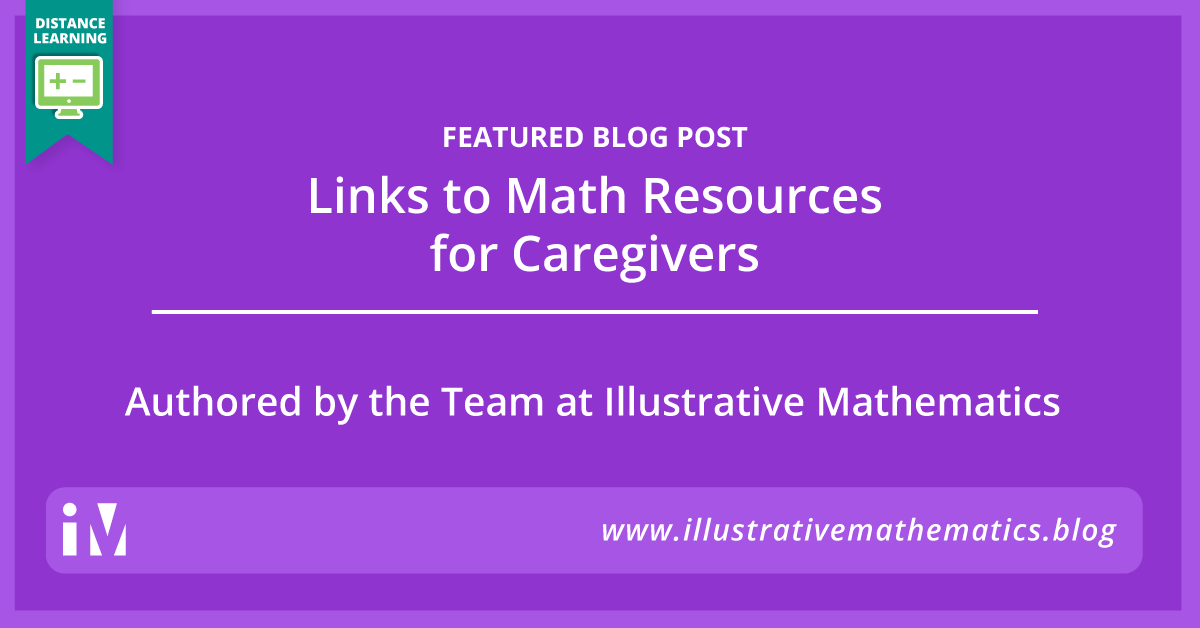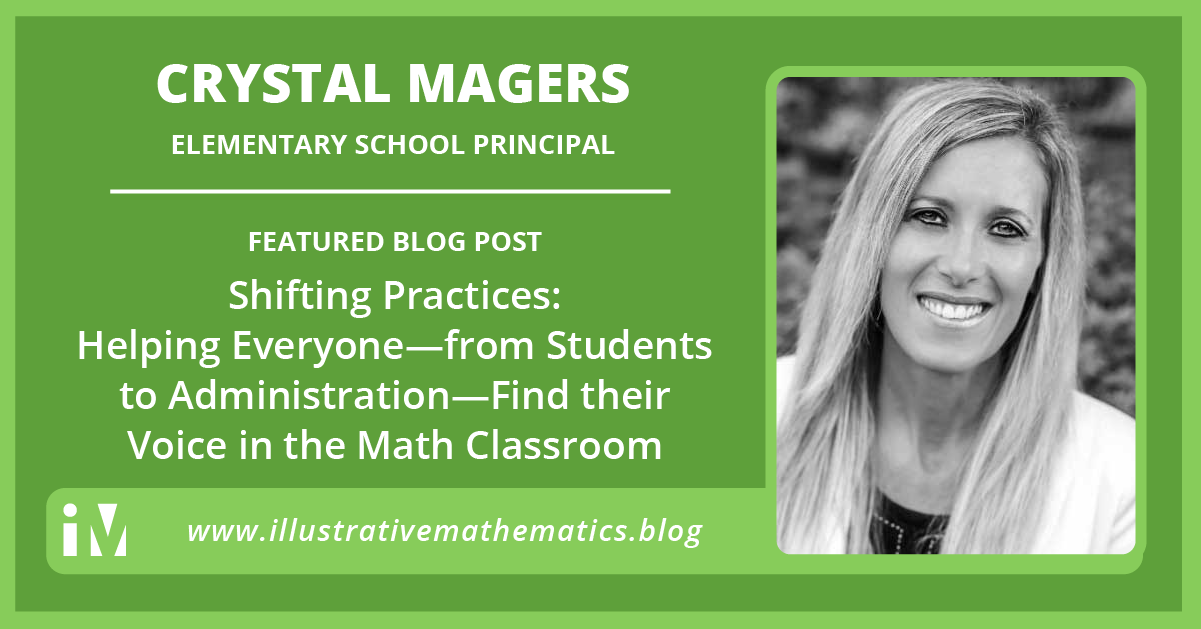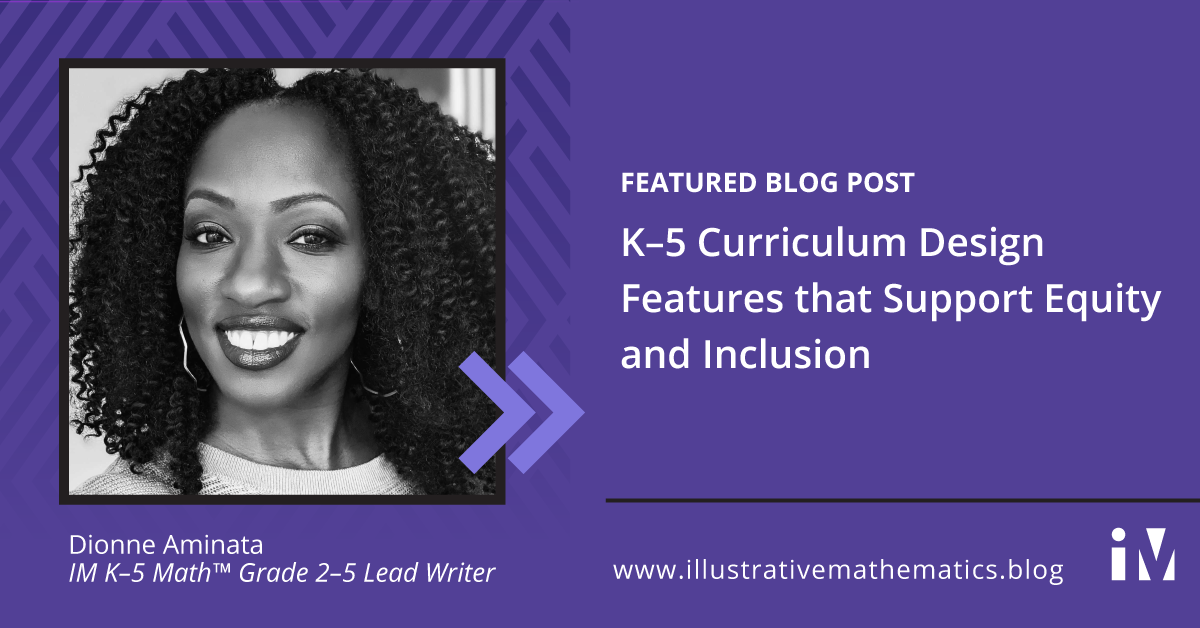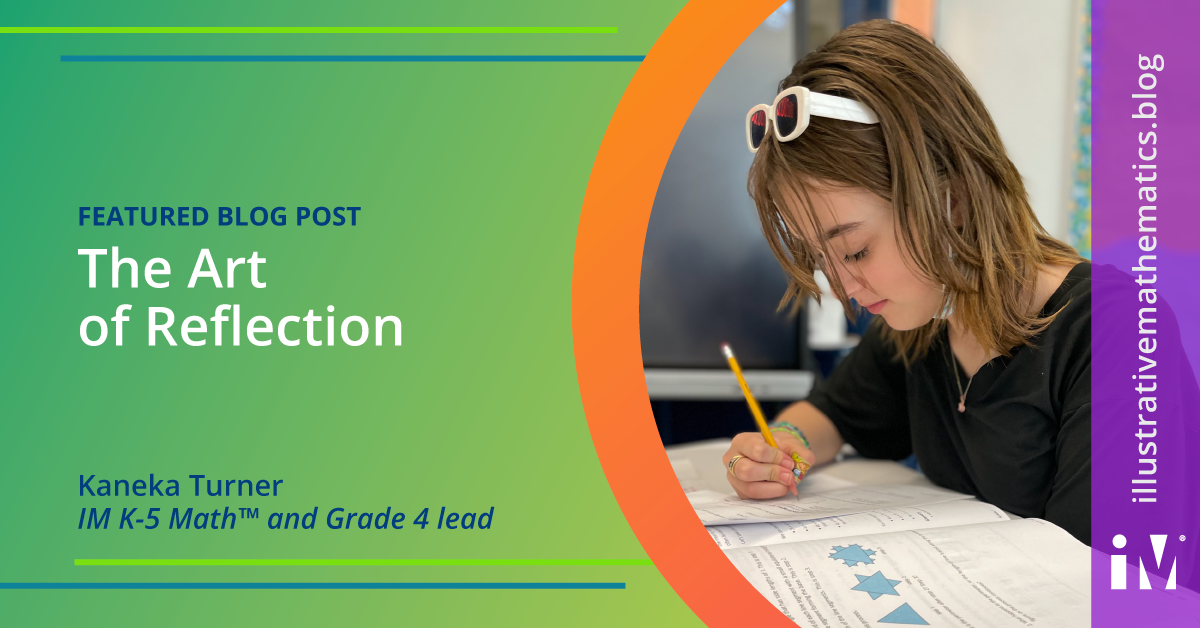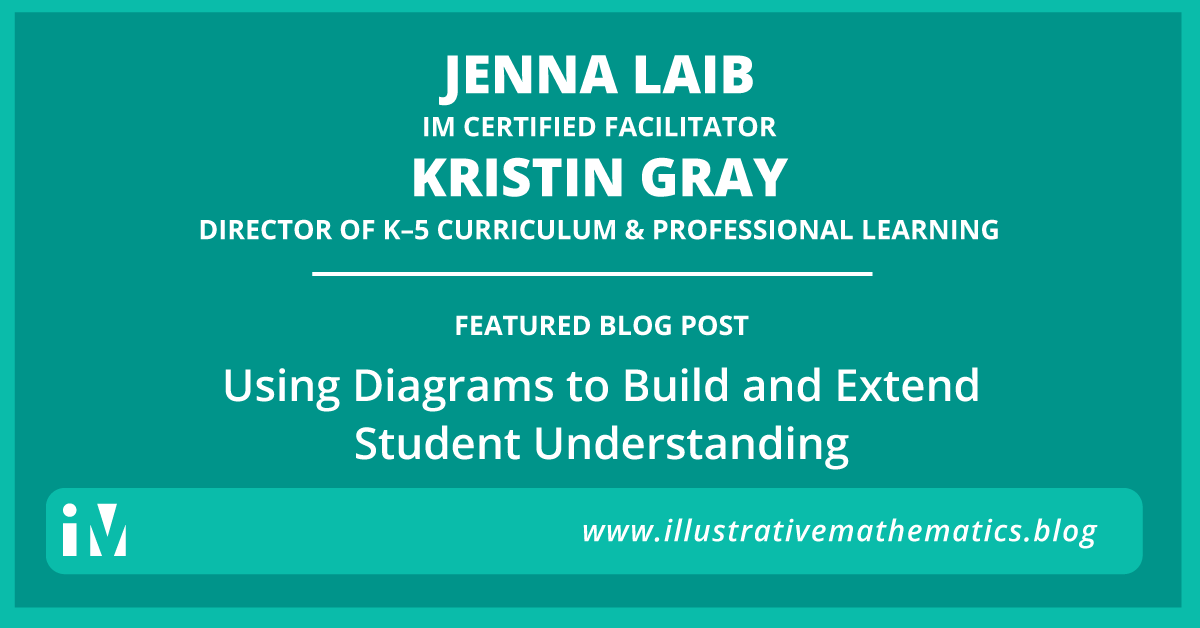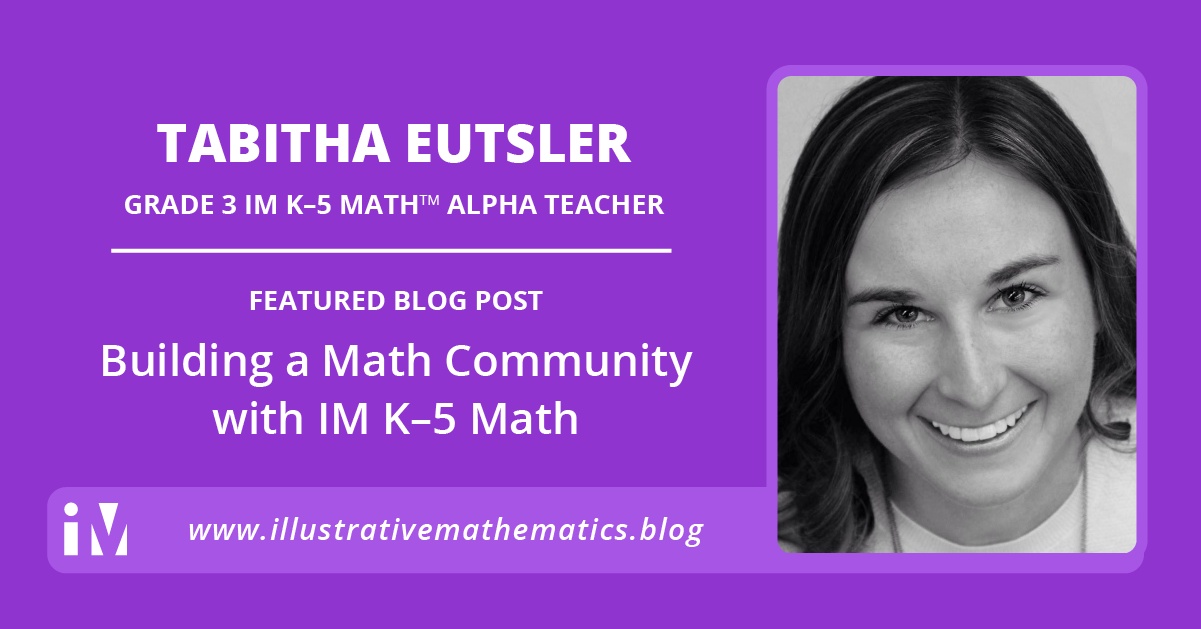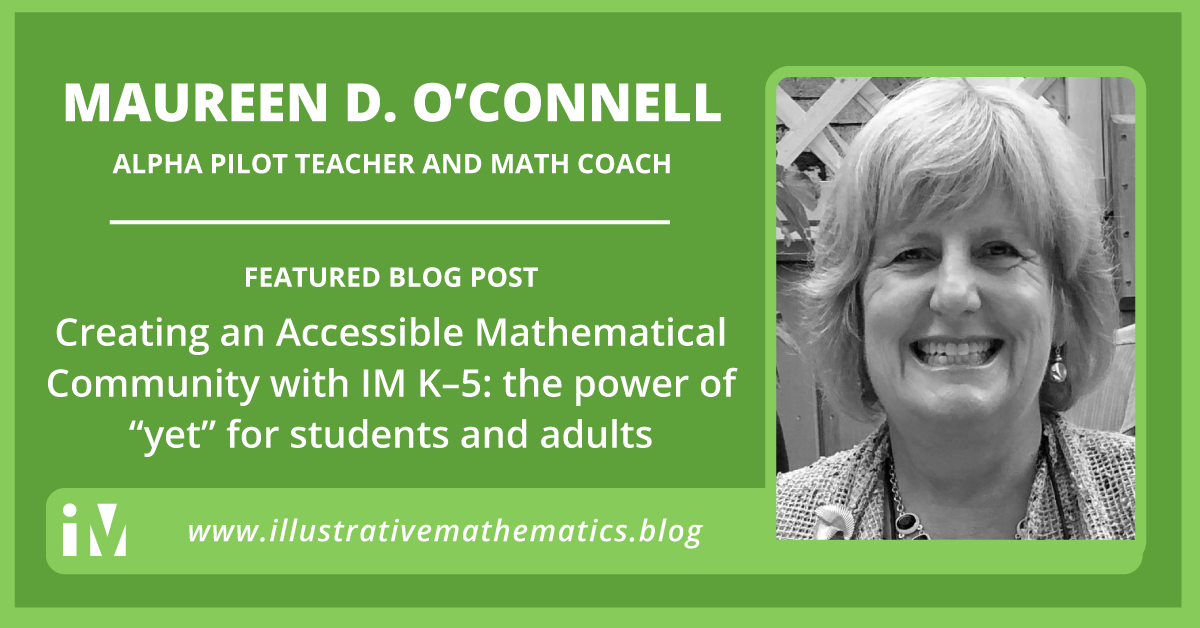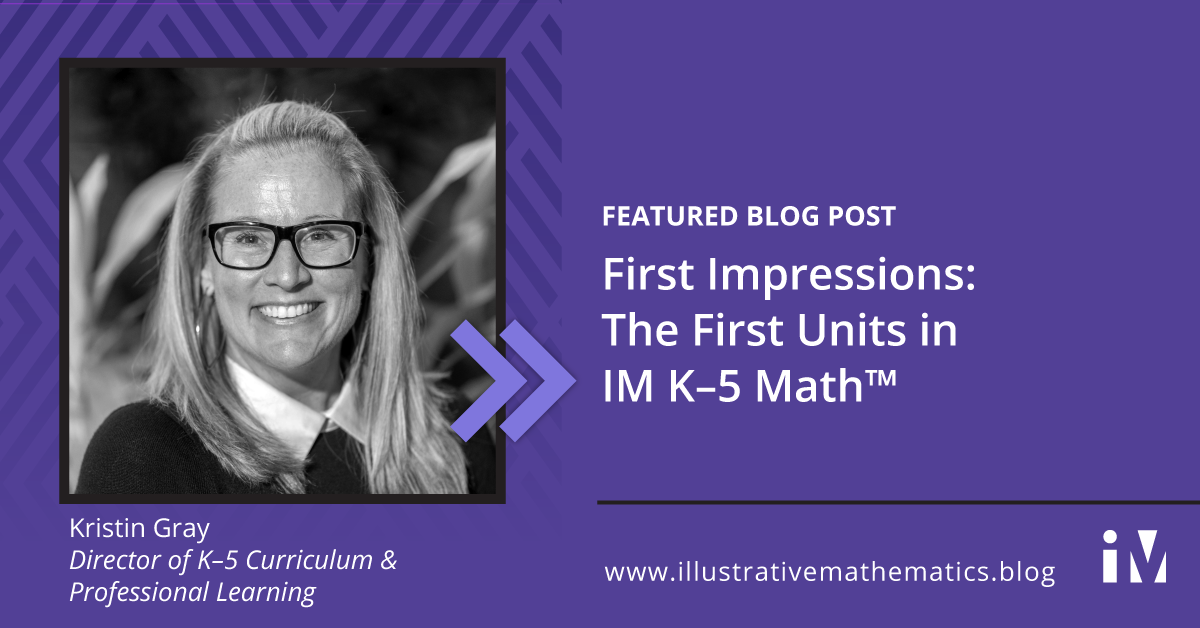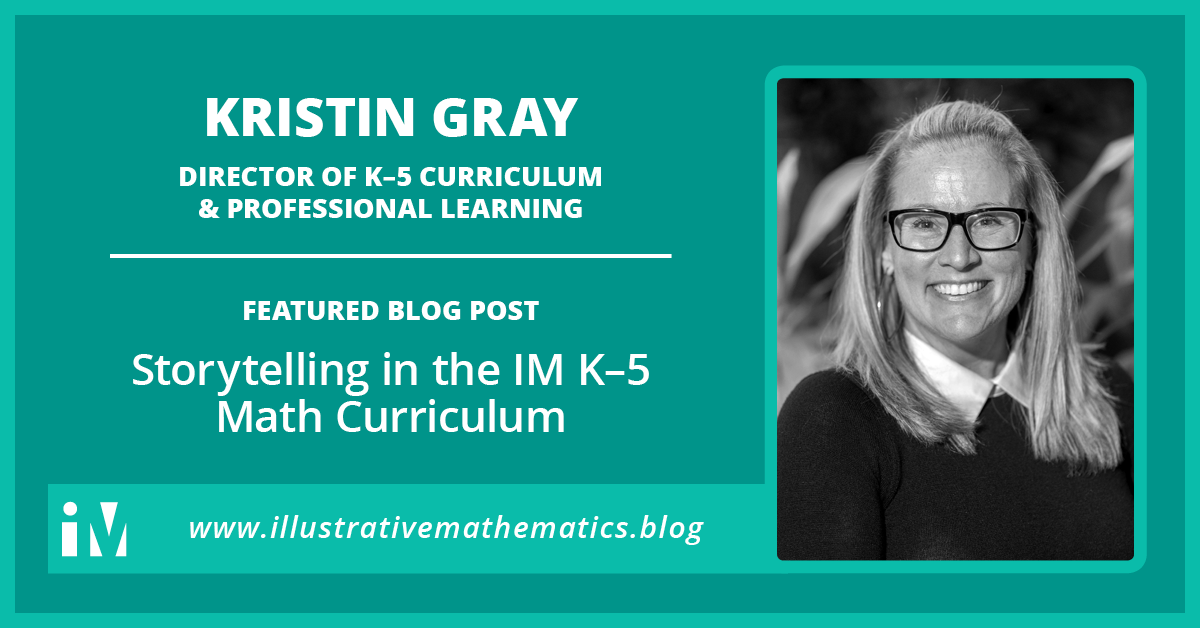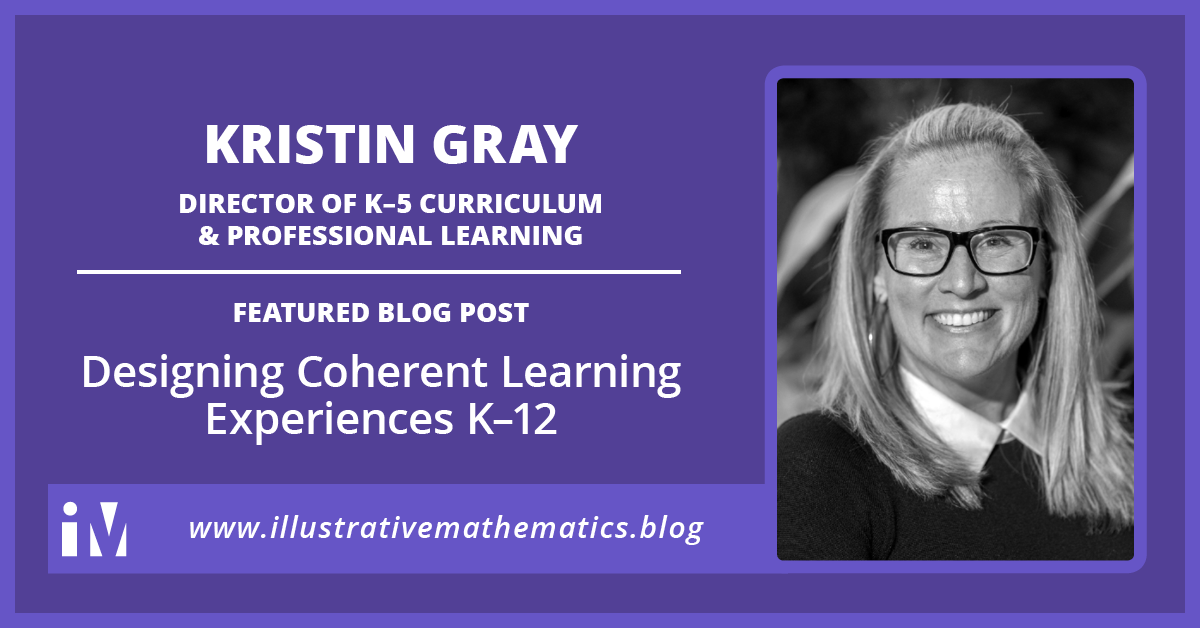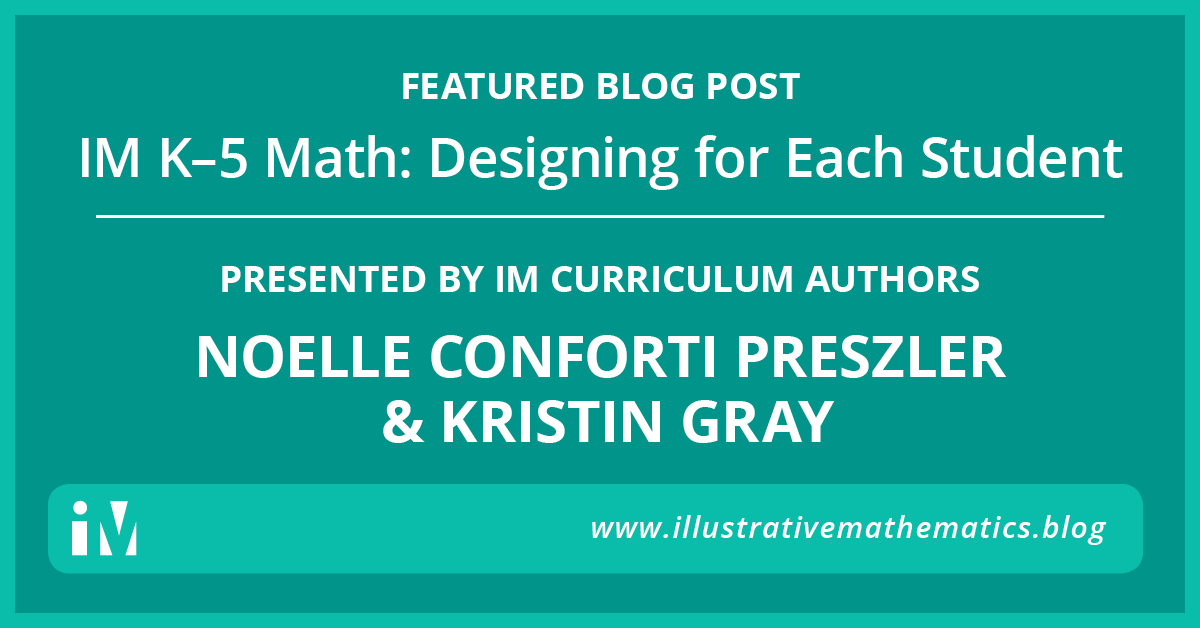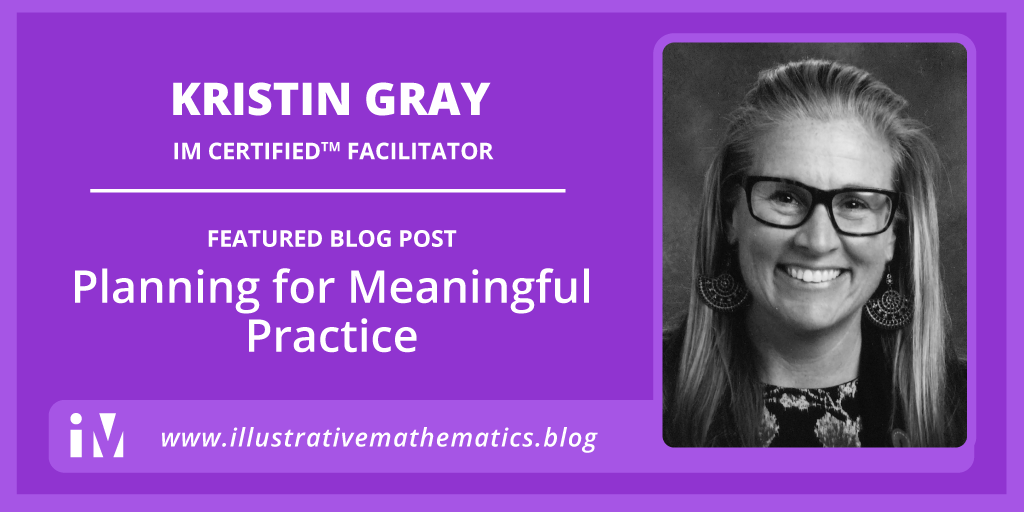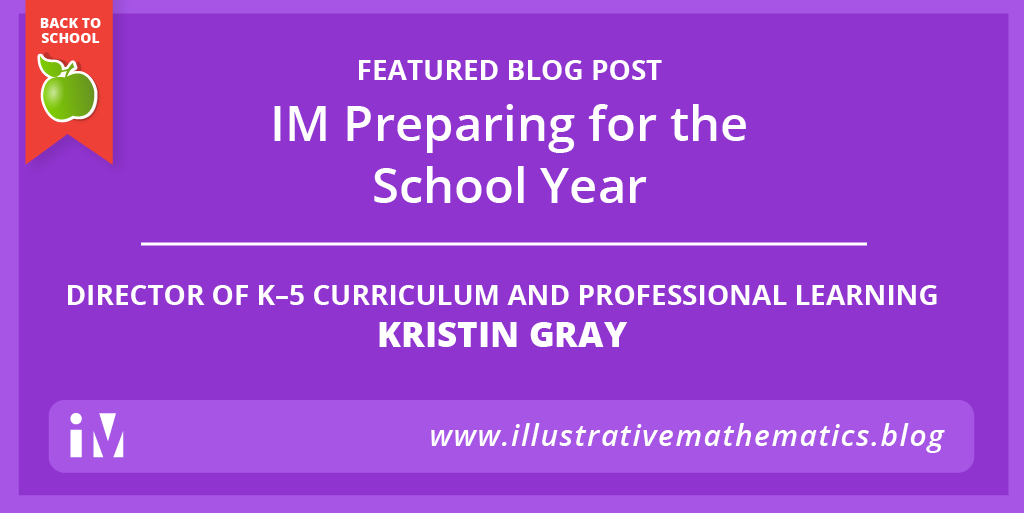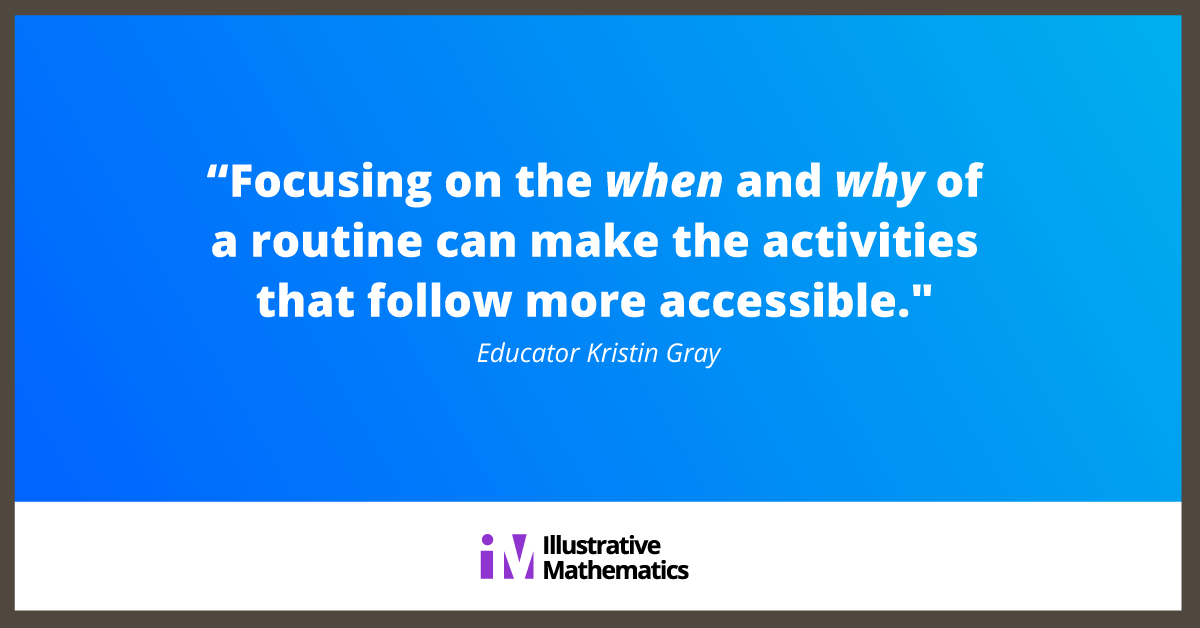Anita Crowder, PhD, Senior Director of Impact Research An ideal Illustrative Mathematics (IM) classroom is one where students’ curiosity drives learning, their feedback shapes instruction, and their identities are embedded...
From Struggle to Success: A Math Coach’s Insights on IM® Math
Apr 17, 2025
Jennifer Cullen, Math Instructional Coach/Interventionist, Hortonville Area School District How do you transform math instruction to reach every student—from those who struggle to those who soar? We recently sat down with...
Teach and Learn Together: A Professional Learning Community in Action
Feb 25, 2025
Deepa Bharath, District Instructional Lead Teacher, Mathematics at Cambridge Public Schools Sarah Caban, Interim Director, K–5 Teacher Learning at Illustrative Mathematics “Illustrative Mathematics is a problem-based...
Using the IMplementation Reflection Tool: Classroom Implementation (Part 3 of 3)
Jan 30, 2025
Catherine Castillo, Sr. Implementation Specialist Claire Neely, Sr. Implementation Specialist "...[I]nstructional capacity for producing meaningful student learning is a function of the interactions among teachers’...
Using the IMplementation Reflection Tool for Collaborative Planning (Part 2 of 3)
Dec 18, 2024
Catherine Castillo, Sr. Implementation Specialist Claire Neely, Sr. Implementation Specialist “When teachers reflect on their students’ learning and their practice together, it can demonstrate that teaching challenges are...
Maximizing the M in STEAM
Nov 8, 2024
Anita Crowder, PhD, Senior Director of Impact Research Kathleen Whittle, Cofounder Teachineers “The only way to learn mathematics is to do mathematics.” – Paul R. Halmos STEAM (science, technology, engineering, art, and...
NCTM and NCSM: A Video Interview With Bill McCallum
Oct 11, 2024
By Bill McCallum, IM CEO and cofounder As CEO and cofounder of Illustrative Mathematics, Bill McCallum shares his reflections from the 56th Annual NCSM Conference and NCTM’s 2024 Annual Meeting & Exposition in Chicago,...
Think Pair Share
Sep 11, 2024
Jennifer Wilson, Senior Director, Implementation Portfolio When teachers are curious about and trust student thinking to drive learning, they create classrooms where students learn mathematics by making sense of problems,...
Reintroducing the IMplementation Reflection Tool
Aug 29, 2024
By Claire Neely, Senior Implementation Specialist Illustrative Mathematics’ redesigned IMplementation Reflection Tool (IRT) is a powerful, non-evaluative resource intended to shape the way your school adopts and implements...
Preparation Matters: Using Strategic Planning to Maintain the Magic in Math Communities All Year Long
Aug 22, 2024
By Meredith Dadigan Abel, K-5 IM Certified® Facilitator When teachers come back from summer break, there is a magical feeling in the air. For me, it’s like the feeling that accompanies the first snowfall of the season....
Annotate and Acknowledge
Aug 9, 2024
By Jen Hawkins, IM Certified® Facilitator and Independent Curriculum Implementation Specialist As I sat at the table in the back of the room, I watched the teacher reveal an image connected to the lesson’s warm-up. She told...
Getting Ready for 2024–2025 Back to School with Illustrative Mathematics
Aug 1, 2024
By the IM Team Welcome to the 2024–2025 school year! As we gear up for another exciting year of learning and growth, Illustrative Mathematics is here to support you every step of the way. This year, we are more committed...
Getting Started with IM Certified® Math
Jul 11, 2024
By Dr. Catherine Castillo, Sr. Specialist, Implementation Portfolio Are you leading IM implementation at your school or district and want to ensure an organized and thoughtful rollout? With the upcoming launch of IM® v....
Visualizing IM K-5 Math in Specialized Academic Settings: Part 3
May 31, 2024
By Brea Jimenez, Specialist, Facilitator Certification and Quality Assurance and April Mouton, Senior Director, Access, Content & Equity Special education is intended to provide bridges between challenges and triumphs...
Leveraging PLCs to Maintain the Magic in Math Communities Throughout the Entire Year
Apr 4, 2024
By Meredith Dadigan Abel, K-5 IM Certified Facilitator When teachers and students come back from spring break, spring fever is in the air, and classroom routines may falter. While teachers have spent the entire year setting...
Elements of Problem-Based Teaching and Learning
Feb 28, 2024
By Max Ray-Riek, Senior Director, Teacher Professional Learning Our vision at IM is a world where all students know, use, and enjoy mathematics. Educators in our IM Community work toward this vision in classrooms day after...
IM Kickoff Message for 2024
Jan 4, 2024
A Look Back and a Look Ahead By Bill McCallum, IM Co-Founder and CEO Hello there, and welcome to 2024! I hope that you have had time to relax and recharge in preparation for all of the excitement that this year will bring....
5 Steps We Must Take To Truly Create An Inclusive, Representative, and Equitable Society
Dec 20, 2023
In her interview with Yitzi Weiner for Authority Magazine, Odalis Amparo (Illustrative Mathematics’ Professional Learning Specialist) emphasizes the significance of culturally responsive and equitable mathematics education....
Reinforcing Conceptual Understanding after Assessments
Dec 7, 2023
By Greta Anderson, CEO of Greta Anderson Consulting, LLC and IM Certified Facilitator There’s a common misconception that has surfaced on a checkpoint, but no additional minutes or days to reteach. How will this impact...
Making math relevant starts with valuing your students’ experiences
Nov 29, 2023
Anita Crowder, Director of Impact at Illustrative Mathematics, reimagines math education by emphasizing the importance of students' own experiences and existing knowledge. She challenges the traditional view of students as...
Visualizing IM K–5 Math™ within a Dream Team of Supports
Nov 9, 2023
By April Mouton, Senior Director, Access, Content & Equity and Brea Jimenez, Specialist, Facilitator Certification and Quality Assurance The Gradual Release of Responsibility approach to learning mathematics—I do, we...
Introducing IM 360: Taking Students Around the World of Mathematics
Oct 18, 2023
By William McCallum, IM CEO You asked, we listened, and now, we are preparing to deliver! I am excited to tell you today about our new curriculum, IM 360, which was developed based on your thoughtful feedback. IM 360 is the...
Building Thinking Classrooms with the IM Curriculum
Sep 1, 2023
By Adrienne Baytops Paul, Math Specialist, UnboundEd, COO of My Mathematical Mind, and former Middle School Teacher The 14 Practices of Peter Liljedahl’s Building Thinking Classrooms (BTC) complement the Illustrative...
Getting Ready for 2023–2024 Back to School: Getting to Know Your Curriculum
Aug 22, 2023
By the IM Team And just like that, school is back in session! Whether you are implementing the IM curriculum for the first time or getting a fresh start as you experience year two or three, the beginning of the year is the...
The IM Experience—Let’s All Know, Use, and Enjoy Mathematics
Jul 31, 2023
By Dionne Aminata, IM Senior Director, Strategic Initiatives As a fully remote organization, the IM team gets a lot done working behind the screens. Now, with IM K–12 Math in full swing, many of us are stepping away from...
Getting Ready for 2023–2024 Back to School: Building a Math Community
Jul 26, 2023
By the IM Team As summer winds down, we understand that you are not rushing toward the finish line of your summer break. Hopefully, there have been many lazy days, trips or adventures, and time spent with family and...
Beyond Curriculum Adoption: A Vision of the IM Classroom
Apr 11, 2023
By William McCallum, IM CEO Here at IM we are excited by and proud of the reception IM K–12 Math™ is getting. As more and more districts adopt it, we are thinking about how to support them. What are the next steps? Our...
The Problem of “Fewer”: Using Centers and the 5 Practices to support students in their production of complex math vocabulary
Feb 9, 2023
By Margaret Betts, IM Certified® Facilitator If story problems are your teacher kryptonite, you aren’t alone. Story problems are mathematical situations expressed with words. The element of reading creates an added layer of...
Centers in Kindergarten: Purposeful Play and Authentic Assessment
Jan 25, 2023
By Cheryl Fricchione, IMCF and Implementation Development Team Member A quick Google search for “kindergarten math centers” produces over 20 million results: everything from tips to make centers work to theme-based...
Representations in the Story of Mathematics
Jan 11, 2023
By William McCallum, IM CEO co·her·ence noun the quality of being logical and consistent. the quality of forming a unified whole. One of the things I am proud of about IM K–12 Math™ is its coherence. This shows up in many...
Looking back at 2022: Year-End Closeout Message from Bill McCallum
Dec 20, 2022
2022 was a remarkable year of growth and achievement at IM. Our employees are energetic, inspired, and committed to our vision of a world where all learners know, use, and enjoy mathematics. I couldn't be more proud of what...
Strategies for Instituting Equitable Math Instruction
Oct 18, 2022
Dionne Aminata, Senior Director of Strategic Initiatives, Marketing, Illustrative Mathematics Rolanda Baldwin, Vice President of Mathematics, UnboundEd Illustrative Mathematics and UnboundEd both agree that achieving racial...
Illustrative Mathematics and IM Certified Partners featured at NCSM and NCTM 2022
Oct 12, 2022
Members of the Illustrative Mathematics team recently attended two national conferences for math educators: NCSM (Sept 26–28, 2022) in Anaheim, CA, and NCTM (Sept 28–Oct 1, 2022) in Los Angeles. We enjoyed meeting so many...
The IM Community Hub is Becoming the IM Resource Hub—Here’s Why
Jul 12, 2022
“Any time we go to the next unit I'm looking for what we can use, tweak, modify, build off of. Everyone is always checking the hub—it has saved us so much time in terms of planning this year.” “It made my ability to support...
Making IM Centers Work: Joyful Practice, Meaningful Fluency, and Authentic Assessment
Jun 13, 2022
By Maureen D. O’Connell “How is it going with your implementation of IM K–5 Math Centers?” That’s my favorite question to ask during professional learning for IM K–5 Math. The response is a pedagogical temperature check...
The Story of Grade 2
May 5, 2022
By Mike Henderson Teaching addition and subtraction in grade 2 is a challenging balancing act. As students move from numbers within 100 to numbers within 1,000, they need to use approaches that involve directly representing...
Towards Coherence
Apr 13, 2022
By William McCallum Last week, we had our first large-scale in-person event in quite a while, a training for new and returning facilitators in Baltimore, with over 110 facilitators and 13 employees attending. I gave a...
IM Curriculum Provides Everything but the Kitchen Sink Needed for Lesson Planning
Mar 30, 2022
By Liza Bondurant, IM Certified® Facilitator/Associate Professor Do you spend hours hunting down materials for your lesson plans? How can you be sure the materials are aligned to your standards? How can you make your lesson...
The Story of Kindergarten
Mar 24, 2022
By Alexandra Clayton Many 5 year olds love to tell you (and show you) how high they can count. This skill of rote counting, saying the counting words in the same order each time, is a lot like singing the ABCs . While...
The Story of Grade 1
Jan 27, 2022
By Brianne Durst Grade 1 teachers have the awesome responsibility of introducing their students to, and helping them build an understanding of, the structure of our number system. This is no small task! Just think about how...
Revisiting Distance Learning with IM K–12 Math™
Jan 18, 2022
With the surge of the Omicron variant, many schools are moving back to distance learning. Although we may not be excited to leave our classrooms again, we are better prepared for distance learning this time around. Most, if...
In the Beginning: Unit 1 in Kindergarten
Dec 7, 2021
By Alex Clayton When was the last time you stepped into an entirely new environment? You weren’t sure exactly what was going to happen. There was no one you recognized. How did you feel: Uncertain? Anxious? Hopeful? During...
Illustrative Mathematics Celebrates 10 Years: Letter from the CEO
Dec 1, 2021
2021 marks our 10th anniversary at Illustrative Mathematics, and we couldn’t be more proud to have impacted so many hundreds of thousands of students, teachers, and families since our humble beginnings in 2011. Our business...
Using IM K–5 Math™ to Support Cognitively Guided Instruction (CGI)
Nov 16, 2021
By Mike Henderson “The activities require skills that students are not taught prior to doing the activity. They’re expected to just jump right in. Why isn’t there more modeling or re-teaching of basic skills so students can...
Remembering Bob Moses
Nov 3, 2021
By William McCallum and Kristin Umland "Math literacy will be a liberation tool for people trying to get out of poverty and the best hope for people trying not to get left behind.” —Bob Moses, 1935–2021 Bob Moses, the civil...
Together Apart: Amplifying the “Gift of Student Thinking” in Distance Learning with IM
Oct 26, 2021
By Maureen D. O’Connell, IM K–5 Math™ Pilot Teacher,IM Certified® Facilitator for IM K–5 Math “The more intensely interested a teacher is in a student’s thinking, the more interested the student becomes in his or her own...
Unlocking Learners’ Thinking Using the Mathematical Language Routines
Oct 5, 2021
By IM Certified Facilitators, Cheryl Fricchione and Rachel Rundstrom Consider this:A child whose primary language isn’t English does not participate in the classroom to the degree that their English-speaking peers do....
FASTalk: Activating the Power of Families to Support Mathematics
Sep 28, 2021
By Elisabeth O’Bryon, co-founder and Chief Impact Officer at Family Engagement Lab and Megan Lorio, Managing Editor at Family Engagement Lab Engaging families in meaningful and equitable ways is a cornerstone of student...
Choosing Math Tools and Representations that Work:
“100 chart-less in Grade 2”
Sep 20, 2021
By Maureen D. O’Connell, Math Specialist Some math tools and representations help students solve in-the-moment problems. Other math tools and representations help students solve problems and grow their conceptual...
Multi-grade Classrooms and
IM K–5 Math™
Sep 8, 2021
By Jen Hawkins, IM Facilitator and IM K-5 Product Specialist Illustrative Mathematics believes that students can achieve success as mathematical thinkers by working through problems and consolidating their learning through...
Introducing the IM Implementation Reflection Tool
Aug 30, 2021
by Liz Ramirez, Director of Implementation “This makes the expectations for what I need to change visible.” “It’s not about the tool. It’s about the conversation using the tool.” Quotes from leaders who participated in IM’s...
A Love for Math Reignited
Jul 26, 2021
By Michael Ramirez, Director of Instructional Coaching, Partnership for Los Angeles Schools “Whenever students are being helped to see major concepts, big ideas, and general principles and are not merely engaged in the...
IM K–5 Math: An End and a Beginning
Jul 13, 2021
By William McCallum On March 20, 2015, I received the following email: Thank you for submitting your proposals to the K–12 OER Collaborative. We are pleased to advise you that Illustrative Mathematics has been selected as a...
Culturally Responsive Teaching and Math
Jun 30, 2021
By Asya Howlette, Director of Mathematics and Science at Thurgood Marshall Raise your hand if you have been perplexed by professional learning that told you your class needs to be culturally responsive, but left you...
Fluency Development Within and Across the Grades in IM K–5 Math™, part 4: Multiplication and Division
Jun 7, 2021
By Dionne Aminata, Grade 2–5 Lead Writer and Sarah Caban, Grade 5 Lead Writer“Some students are never given the opportunity to engage with mathematics in rich and meaningful ways that emphasize critical thinking and problem...
Fluency Development Within and Across the Grades in IM K–5 Math™, part 3: Multiplication and Division
Jun 1, 2021
By Dionne Aminata, Grade 2–5 Lead Writer and Sarah Caban, Grade 5 Lead Writer “The idea of being a ‘math person’ is based on two pervasive world views; first, the so-called ‘fixed’ mindset, that what one knows about math...
What does it mean to enjoy mathematics?
May 17, 2021
By William McCallum When I started this series of blog posts on what it means to know, use, and enjoy mathematics, I thought this one would be the easiest. Math is fun, right? How could you not enjoy mathematics? I...
Fluency Development Within and Across the Grades in IM K-5 Math™, part 2: Addition and Subtraction
Apr 27, 2021
By Dionne Aminata, Grade 2–5 Lead Writer and Sarah Caban, Grade 5 Lead Writer"We have to break from the notion that learning mathematics must be a linear and procedural endeavor mastered through rote practice and...
Fluency Development Within and Across the Grades in IM K–5 Math™, part 1: Addition and Subtraction
Apr 20, 2021
By Dionne Aminata, Grade 2–5 Lead Writer and Sarah Caban, Grade 5 Lead WriterWhen do students practice their math facts? How is math fluency assessed?”—current and prospective IM K-5 Math™ teachers everywhere We appreciate...
The Joy of Fluency
Apr 5, 2021
By William McCallum I’m not a very good skier, but I have once or twice in my life experienced the joy of a perfect run: gliding down the slopes, taking each turn with confidence. And I’ve had terrible runs where I...
Building Equitable Learning Environments for Each Student
Mar 22, 2021
By Danielle Seabold, IM Certified® Facilitator “All students can be successful in mathematics.” For most mathematics educators, we lean into this. We believe that all students can learn mathematics, and that they can be...
Explorations in IM K–5 Math: Challenges for Curious Students
Mar 2, 2021
By Jen Hawkins and Mike Nakamaye What do we do with curious students who are ready, willing, and able to go further with math ideas? Some students cannot wait to dig deeper into the mathematics they are studying in class....
What Does It Mean to Use Mathematics?
Feb 22, 2021
By William McCallum Our vision at Illustrative Mathematics is a world where all learners know, use, and enjoy mathematics. In my last post I picked up that first verb and talked about what it means to know mathematics. In...
Supporting Culturally Responsive Pedagogy with IM K–5 Math™
Feb 17, 2021
By Dionne Aminata “We are striving to . . . compose a country committed to all cultures, colors, characters, and conditions of man. And so we lift our gazes not to what stands between us, but what stands before us.” Poet...
By the End of Grade 3: Developing Fluency with Multiplication
Jan 25, 2021
By Zack Hill The major work of grade 3 includes representing and solving problems that involve multiplication and division. Then, by the end of grade 3, students are expected to know from memory all products of two...
What does it mean to know mathematics?
Jan 4, 2021
By William McCallum A world where all learners know, use, and enjoy mathematics. Perhaps the most mysterious verb in the IM vision—a world where all learners know, use, and enjoy mathematics—is the first one: know. Knowing...
Creating Time and Space for Students to Develop Foundational Mathematical Ideas
Nov 16, 2020
By Maureen D. O'Connell “Slow down, you’re moving too fast, you got to make the morning last...” When we consider early childhood mathematics this familiar song comes to mind. In our hurried society where more is more,...
Making Sense of Story Problems
Oct 27, 2020
by Deborah Peart, Grade 2 Lead Many people have an aversion to word problems. They cringe at the mention of them. In elementary classrooms, teachers often report that this is what their students struggle with most. When...
Planning for the Student Experience
Sep 4, 2020
by Sarah Caban and Kristin Gray Teachers are so amazing and resilient. Amid all of the many thoughts and feelings about the challenges this school year brings, conversation continually revolves around their students. When...
Facilitating the “Choral Counting” Routine Online
Aug 25, 2020
by Janaki Nagarajan How can we best do mathematics together in an online environment? When school suddenly shifted online last spring, I found myself overwhelmed by the learning curve for new technologies—for both myself...
Helping Elementary Students Cultivate a Strong Math Community
Aug 18, 2020
by LaToya Byrd and Jenna Laib School looks different this year. It’s easy to focus on the changes that will need to be made—the new practices, the new routines, the new technologies—but we must first focus on our central...
Looking to the Fall, Part 2: Creating a Supportive Resource for K–5 Teachers
May 20, 2020
By Kristin Gray, Director K–5 Curriculum and Professional Learningand Kevin Liner, IM K–5 Professional Learning Lead In our previous post, we highlighted important considerations in planning to support students in the fall....
Looking to the Fall, Part 1: Welcoming and Supporting K–5 Students
May 7, 2020
By Kristin Gray, Director K–5 Curriculum and Professional Learningand Kevin Liner, IM K–5 Professional Learning Lead It is overwhelming to think about how teaching and learning will look in the fall. The uncertainty of the...
IM Talking Math
Mar 26, 2020
By Kristin Gray Most importantly, I hope everyone is taking care of themselves, their families, and others as much as they are able to during this time. With schools and districts pushing instruction online with a quick...
Links to Math Resources for Caregivers
Mar 14, 2020
Here is a collection of links the content team here at IM has used with our own students and kids to start mathematical conversations, play math games together, explore new topics, come up with projects, and have fun. There...
Shifting Practices: Helping Everyone—from Students to Administration—Find their Voice in the Math Classroom
Feb 29, 2020
It was easy to say yes! By Crystal Magers Last spring, I was approached by our Math Coordinator and asked about piloting a new math program. I knew my staff was ready for building-wide consistency and we were ready to try...
K–5 Curriculum Design Features that Support Equity and Inclusion
Feb 29, 2020
By Dionne Aminata Before I joined the K–5 curriculum writing team at IM, I was a K–8 regional math content specialist for a public charter organization that largely consisted of Title I schools, or schools receiving federal...
When is a number line not a number line?
Feb 15, 2020
By William McCallum The number line is a seemingly simple object: a straight line with two points marked 0 and 1. Those two points are the seeds of great complexity, however. Whole numbers are located at positions marked...
The Art of Reflection
Feb 3, 2020
“In times of stress, the best thing we can do for each other is to listen with our ears and our hearts and to be assured that our questions are just as important as our answers.” —Mr. (Fred) Rogers By Kaneka Turner We are...
Using Diagrams to Build and Extend Student Understanding
Nov 25, 2019
By Jenna Laib and Kristin Gray Take a moment to think about the value of each expression below. $\frac{1}{4}\times \frac{1}{3}$ $\frac{1}{4}\times \frac{2}{3}$ $\frac{2}{4}\times \frac{2}{3}$ $\frac{3}{4}\times...
Building a Math Community with IM K–5 Math
Nov 2, 2019
“I’m not sure this is working. Only five of my students are participating and commenting each day. The rest sit there and look at me.” By Tabitha Eutsler This was my conversation with our math coordinator after my first few...
Creating an Accessible Mathematical Community with IM K–5: the power of “yet” for students and adults
Oct 22, 2019
Does the perfect elementary math curriculum exist? Armed with a growth mindset and the Alpha IM K–5 curriculum, teachers in Ipswich Public Schools push their thinking to reach all mathematicians. By Maureen D. O’Connell I...
Using Instructional Routines to Inspire Deep Thinking
Oct 13, 2019
We want students to think about math deeply. Creatively. Analytically. Instead, what often happens is that students race towards quick solutions. So what can we do to support this other kind of thinking in class—the slow,...
Which Vertex is the Center of a Triangle?
Sep 23, 2019
By William McCallum I am sometimes asked what is the secret to the success of our curriculum, what is the special property that sets it apart from other curricula. That question is like the one in the title of this blog...
First Impressions: The First Units in IM K–5 Math
Jul 23, 2019
“I've learned that people will forget what you said, people will forget what you did, but people will never forget how you made them feel.” Maya Angelou By Kristin Gray When I think back to my 8th grade math class, I...
Realizing the promise of open resources, part II
Jun 17, 2019
By William McCallum In my first post on the topic of realizing the promise of open educational resources, I described the IM Certified program. Our partners offer multiple versions, including a free online version and...
Storytelling in the IM K-5 Math Curriculum
Jun 4, 2019
By Kristin Gray, Director of K–5 Curriculum & Professional Learning Curriculum "An excellent mathematics program includes a curriculum that develops important mathematics along coherent learning progressions and...
The Power of Small Ideas
May 21, 2019
By William McCallum, IM President Big ideas are popular in mathematics education, and you can find many lists of big ideas on the web. Some are more thoughtful than others, and I can see how some might be useful for...
Designing Coherent Learning Experiences K-12
May 7, 2019
By Kristin Gray, Director of K–5 Curriculum & Professional Learning One challenge in curriculum design is considering all we know and believe to be true about math teaching and learning and translating that into...
What is a Measurable Attribute?
Apr 8, 2019
By Kristin Umland,VP Content Development A great conversation I had with the IM elementary school curriculum writing team got me thinking: What is a measurable attribute? That is, when given an object, what can we measure...
IM K-5 Math: Designing for Each Student
Feb 26, 2019
By Noelle Conforti Preszler and Kristin Gray In the following activity, think about the students in your classroom. How might each respond? What do you notice? What do you wonder? This activity is the drafted warm-up of the...
Realizing the promise of open resources
Jan 25, 2019
By William McCallum All of our curriculum here at Illustrative Mathematics is released under a Creative Commons Attribution (CC-BY) license, which allows anyone to "copy and redistribute the material in any medium or...
The Power of Noticing and Wondering
Dec 3, 2018
My first years of teaching, I worried my students looked at me much like Ben Stein as the teacher in Ferris Bueller’s Day Off. I cringe to think about the series of monotonous and leading questions I strung together to a...
Planning for Meaningful Practice
Sep 19, 2018
There is no shortage of available math resources for teachers to use in their classrooms. The difficult and time-consuming job for teachers is weeding through all of the tools to decide which best supports students in...
IM Preparing for the School Year
Aug 6, 2018
There are always so many things to do in preparation for a new school year. At this point of the summer, to-do lists start getting made, materials get purchased, rooms are organized, and math class planning begins....
The IM 6–8 Math Curriculum Changed My Math Methods Experience
Jun 4, 2018
By Anna Polsgrove When I first started the Math Methods course at University of California, Irvine, all of my ideas on how to learn math took a complete 180. During the first two months, a million questions swirled in my...
NCSM and NCTM 2018 Roundup
Apr 30, 2018
It was great to see so many of you at NCSM and NCTM. If we missed you, or you weren’t able to attend, read our NCSM and NCTM round-up below. We enjoyed the conversations we had with those of you that are using the IM 6–8...
Using Math Routines to Build Number Sense in First Grade
Apr 3, 2018
By Allison Van Voy When I started teaching four years ago, I had no idea how important number sense was to a student’s math understanding. I was fresh out of college, brand new to teaching, and number sense was not a...
Warm-up Routines With a Purpose
Feb 27, 2018
By Kristin Gray As a teacher, curiosity around students’ mathematical thinking was the driving force behind the teaching and learning in my classroom. To better understand what they were thinking, I needed to not only have...
Adapting Problems to Elicit Student Thinking
Feb 18, 2018
By Jody Guarino As a teacher, I constantly wonder how I can elicit student thinking in order to gain insight into the current thinking of my students and leverage their thoughts and ideas to build mathematical...
Misconceptions about Multiple Methods
May 24, 2017
By William McCallum You may have noticed that I am back to publishing regular blog posts! My goal for now is a blog post every second Wednesday. I am now also trying to answer forum questions promptly. I want to thank the...
to the IM Blog and Newsletter
RECENT POSTS
- Research Study Finds Students Using IM Certified® Curricula Outperform Peers in Math Achievement June 13, 2025
- Unlocking the ‘Our’ in Discourse May 28, 2025
- Student Voice: The Signal, Not the Noise May 15, 2025
- From Struggle to Success: A Math Coach’s Insights on IM® Math April 17, 2025
- Teach and Learn Together: A Professional Learning Community in Action February 25, 2025
Categories
- Assessment (1)
- Back to School (6)
- Classroom Community (5)
- Classroom Discourse (6)
- Coaches Corner (6)
- Computational Fluency (2)
- Equity (5)
- Grades 3–5 Math (121)
- Grades 6–8 Math (132)
- Grades 9–12 Math (106)
- Grades K–2 Math (101)
- Grades K–5 Math (68)
- Implementation (6)
- In the Classroom (9)
- Instructional Routines (5)
- Lesson Planning (3)
- Math Content (3)
- Math Language Routines (3)
- Partners (5)
- Problem-Based Learning (4)
- Professional Learning (85)
- Recent Blog Posts (12)
- Research Studies (1)
- Supports for English Language Learners (1)
- Supports for Students with Disabilities (3)
- Unfinished Learning (1)

